

April 11, 2024

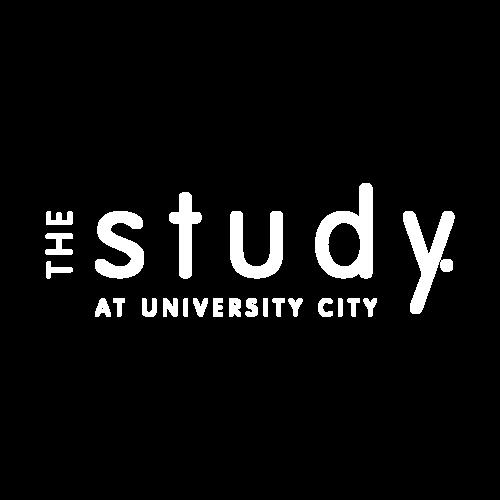

We are Quaker Creative, the Daily Pennsylvanian's creative agency.
We offer a variety of services in the advertising and marketing realm that can help you and your business create valuable digital and print materials needed to take your organization to the next level.
As an extension of The Daily Pennsylvanian, Inc., we are a nonprofit organization comprised of student and professional staff with a variety of skill sets, and we are certain that we can provide your business with the services and resources necessary for success. Our mission is to provide the students at UPenn pursuing this type of work realworld experience while also making these services more accessible to business within the Philadelphia community.

Table of Contents
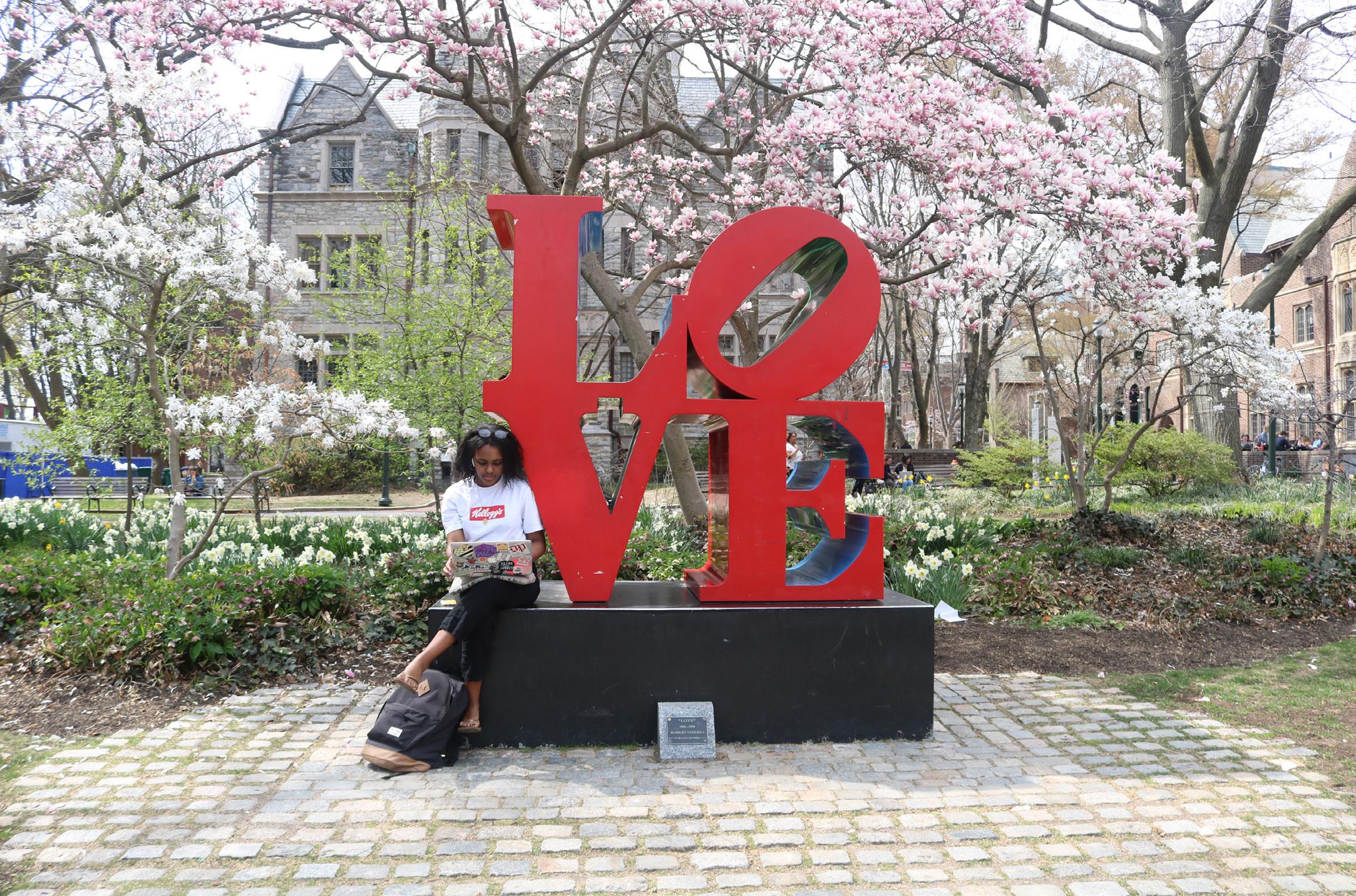
The Daily Pennsylvanian welcomes the Class of 2028 to Penn! The Quaker Days Special Issue explores the need-to-know information for newly accepted students and their families. The DP’s coverage in this issue explores admissions, student life, housing and dining, and more. Again, welcome to Penn and please enjoy this edition of the DP.
This issue is sponsored by
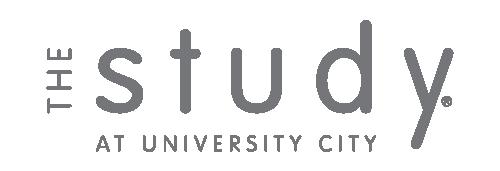
2 QUAKER DAYS THURSDAY, APRIL 11, 2024 | THEDP.COM THE DAILY PENNSYLVANIAN
Admissions 4-8 10-13 17-19 14-16 20-21 22-23 Campus Life Academics Opinion Financial Aid Sports
PHOTO BY BIRUK TIBEBE
Cover design by YAXLEI ALEJO-ORTIZ
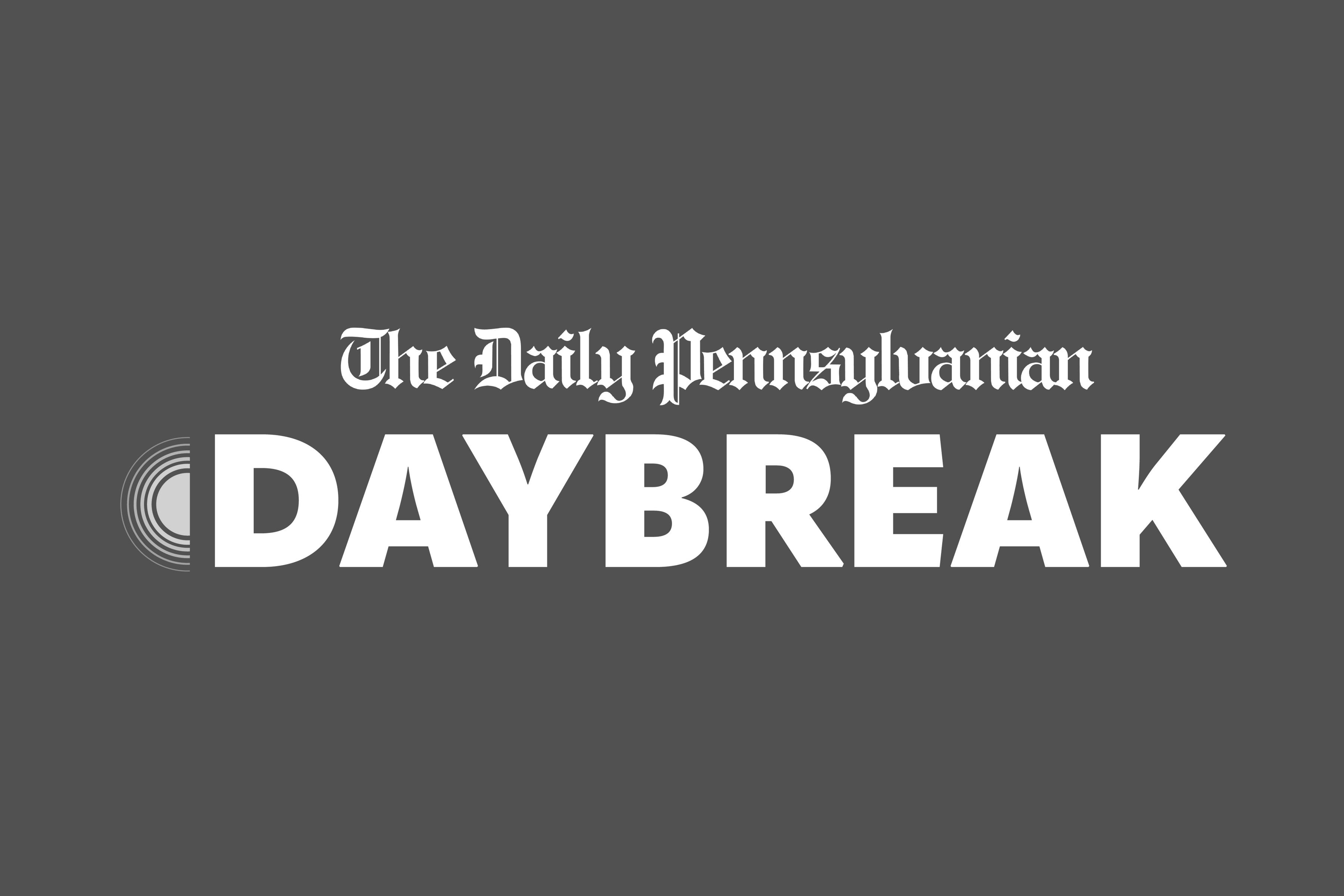
Want to stay updated on breaking news at Penn?
Alumni, parents, students, and faculty alike count on DP Daybreak for consistent, quality coverage of all things Penn. Use the QR code below to subscribe to The Daily Pennsylvanian’s daily newsletter.

3 QUAKER DAYS THURSDAY, APRIL 11, 2024 THEDP.COM | THE DAILY PENNSYLVANIAN
Penn announces early decision results for Class of 2028 amid increase in applications
Over 8,500 students applied to Penn through the Early Decision program this year, according to the University’s announcement.
BEN BINDAY AND KATIE BARTLETT News Editors
Penn announced early decision admissions for the Class of 2028, admitting around half of the University's first new class of students since the Supreme Court’s overturn of affirmative action.
Over 8,500 students applied to Penn through the Early Decision program this year, according to the University’s announcement — an increase over last year’s total of over 8,000 applicants. The results were announced on Dec. 14 at 7 p.m.
Penn did not immediately disclose the acceptance rate for applicants through the Early Decision program, continuing its decision to not publicly announce its acceptance rate during the regular decisions admissions cycle for the Class of 2026.
The announcement of results for the Class of 2028 comes amid an unprecedented semester for the University. In the past week alone, both Penn's president and Board of Trustees chair have resigned and been replaced by leaders currently serving in an interim capacity, and many students have expressed concerns about antisemitism and Islamophobia on campus throughout the fall semester.

"Representing the first half of the Class of 2028, these future Quakers admitted through Early Decision will join us from 68 countries, 41 states, D.C., Puerto Rico, the U.S. Virgin Islands, and right here from our home of Philadelphia," Vice Provost and Dean of Admissions Whitney Soule wrote in the announcement. At a Board of Trustees meeting earlier this year, Soule reported that Penn received 59,465 applications to the Class of 2027 — a new record — and had an acceptance rate of 5.8%.
3,474 students were offered admission, representing 48 states and 97 countries.
Soule stated that first generation college students make up 19% of the admitted class, while 14% are legacy students.
This year has also been
one with many changes to Penn's admissions policies.
Ahead of last year’s release of early decisions, Penn Admissions announced the removal of the $400 enrollment deposit — which typically signifies an “intent to enroll” at the University — for the Class of 2027 and future accepted classes. The new policy remains in place for this admissions cycle.
In June, the Supreme Court overturned affirmative action in college admissions in a 6-3 decision. At the time, The Daily Pennsylvanian spoke with Penn community members about the decision’s implications, with many echoing criticism of the decision and concern for the future.
Following the decision, former Penn President Liz Magill and Provost John L.
Jackson Jr. released a statement suggesting that Penn’s commitment to diversity would remain unchanged.
“We will seek ways to admit individual students who will contribute to the kind of exceptional community that is essential to Penn’s educational mission,” Magill and Jackson wrote at the time.
Soule also released a blog post about the decision.
"We will need to review and revise our practices to ensure that we are fully compliant with the law. What will not change is our commitment to creating a diverse community as central to the educational experience at Penn," she wrote.
Penn made several changes to its application for the 2023-24 admissions cycle. An essay prompt unique to
each undergraduate school was added to the application on July 31, a transition from the previous single short answer used for all four schools.
Additionally, alumni interviews became alumni ‘conversations,’ which are not required but “strongly encouraged,” Laurie Kopp Weingarten, the president and chief educational consultant at One-Stop College Counseling, told the DP. The application also removed a question about applicants’ intended area of study while adding one about campus group involvement.
ACT and SAT test score submissions remain optional for applicants, a change that was made for the 2020-2021 admissions cycle in response to the COVID-19 pandemic.
4 QUAKER DAYS THURSDAY, APRIL 11, 2024 | THEDP.COM THE DAILY PENNSYLVANIAN
PHOTO BY ABHIRAM JUVVADI
Penn extends test-optional policy for Class of 2029 while some Ivies reinstate testing requirement
The Penn Admissions announcement did not include any rationale for the extension.
ELEA CASTIGLIONE Senior Reporter
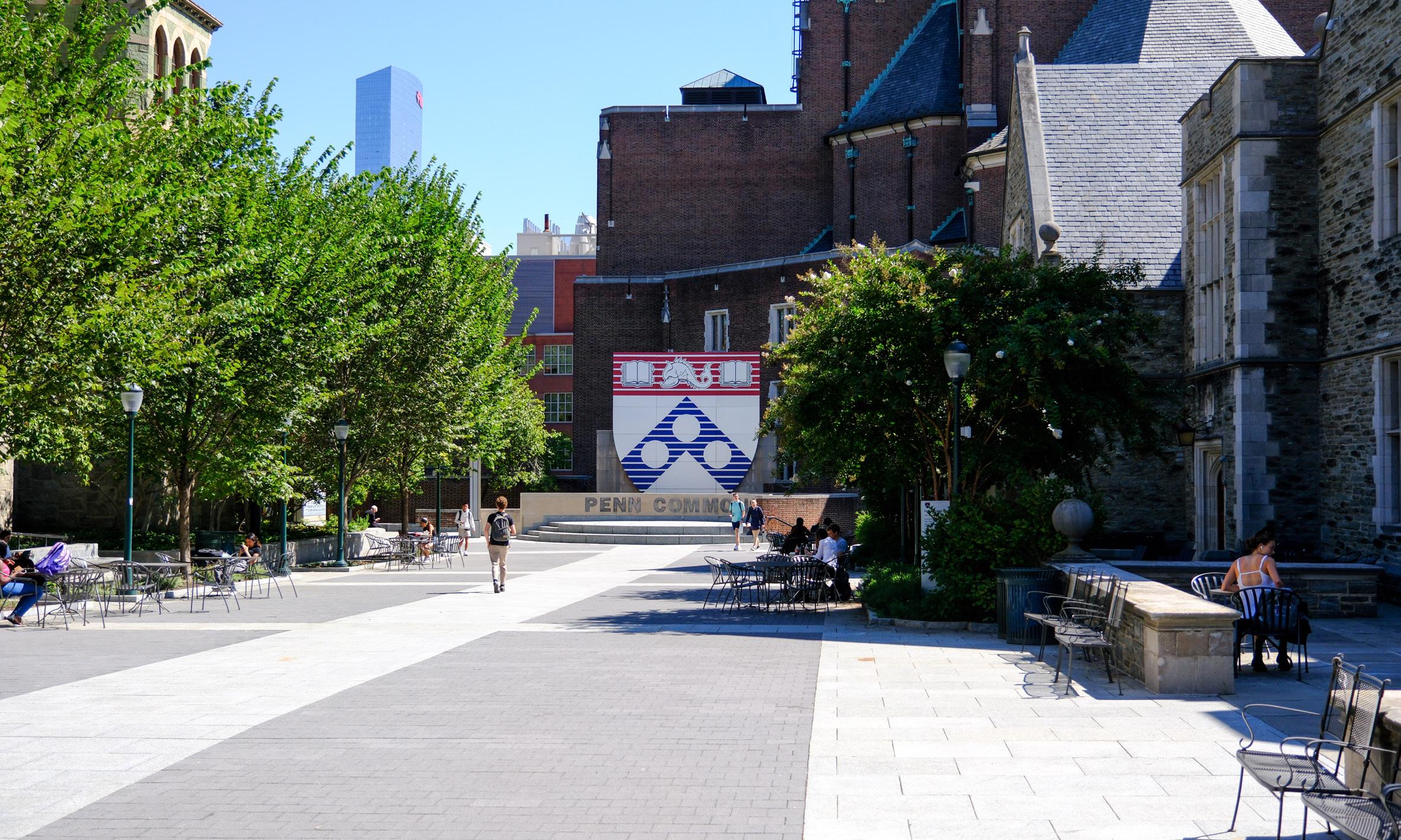
Penn extended its testoptional application policy for the 2024-25 admissions cycle, despite several peer institutions recently reinstating their standardized testing requirements.
In a March 5 announcement, Penn Admissions wrote that the University will continue its policy of being test-optional for Class of 2029 applicants — making Penn the latest school to officially announce its policy amid a divided Ivy League. Students may still elect to submit standardized test scores, and students who do not submit scores “will not be at a disadvantage in the admissions process,” according to the announcement.
The Penn Admissions
announcement did not include any rationale for the extension.
Penn’s test-optional policy was first implemented due to the COVID-19 pandemic during the 2020-21 admissions cycle. The testoptional policy has since been extended for every application cycle.
Other universities are split on whether to extend pandemic-era policies that made standardized test score submissions optional.
Earlier on March 5, Brown University announced that it will reinstate its standardized test requirement for the Class of 2029. Brown's decision followed those of several other universities.
In early February, Dart-
mouth College removed its test-optional policy and returned to requiring standardized test scores for the incoming Class of 2029 and beyond — citing a research group which found that “standardized test scores are an important predictor of a student’s success in Dartmouth’s curriculum” regardless of a “student’s background or family income.”
On Feb. 22, Yale University announced that it will implement a “test-flexible” policy for applicants starting in fall 2025. Yale will require standardized test scores, but will give students the option to submit subject-based Advanced Placement or International Baccalaureate tests instead
of SAT or ACT scores.
The remainder of the Ivy League universities will continue their test-optional policies through the 202425 application cycle.
In 2021, Harvard University announced applicants through the Class of 2030 would be able to choose whether to submit standardized test scores, although Harvard has not announced whether this will change for applicants after then. Cornell University extended its test-optional policy in February through fall 2025, and Princeton University's policy remains active through the 2025-26 cycle.
In March of last year, Columbia University implemented a permanent
test-optional policy for applicants to the College and the School of Engineering and Applied Science — the first Ivy to do so.
Interim President Larry Jameson’s prepared remarks for a March 1 Board of Trustees meeting — which was interrupted by protestors and adjourned — state that Penn received an all-time high in applications of 65,230 for the Class of 2028. This count represents a nearly 10% increase from applications for the Class of 2027.
Last admissions cycle, Penn received a record of more than 59,000 applications to the Class of 2027 — around a 7% increase from the previous year.
5 QUAKER DAYS THURSDAY, APRIL 11, 2024 THEDP.COM | THE DAILY PENNSYLVANIAN
PHOTO BY ABHIRAM JUVVADI
From Ghana to Maryland, meet five members of the Early Decision class of 2028
The Daily Pennsylvanian spoke with five members of the Class of 2028 about their backgrounds, aspirations, and what drew them to choose Penn.
JAMIE KIM Staff Reporter
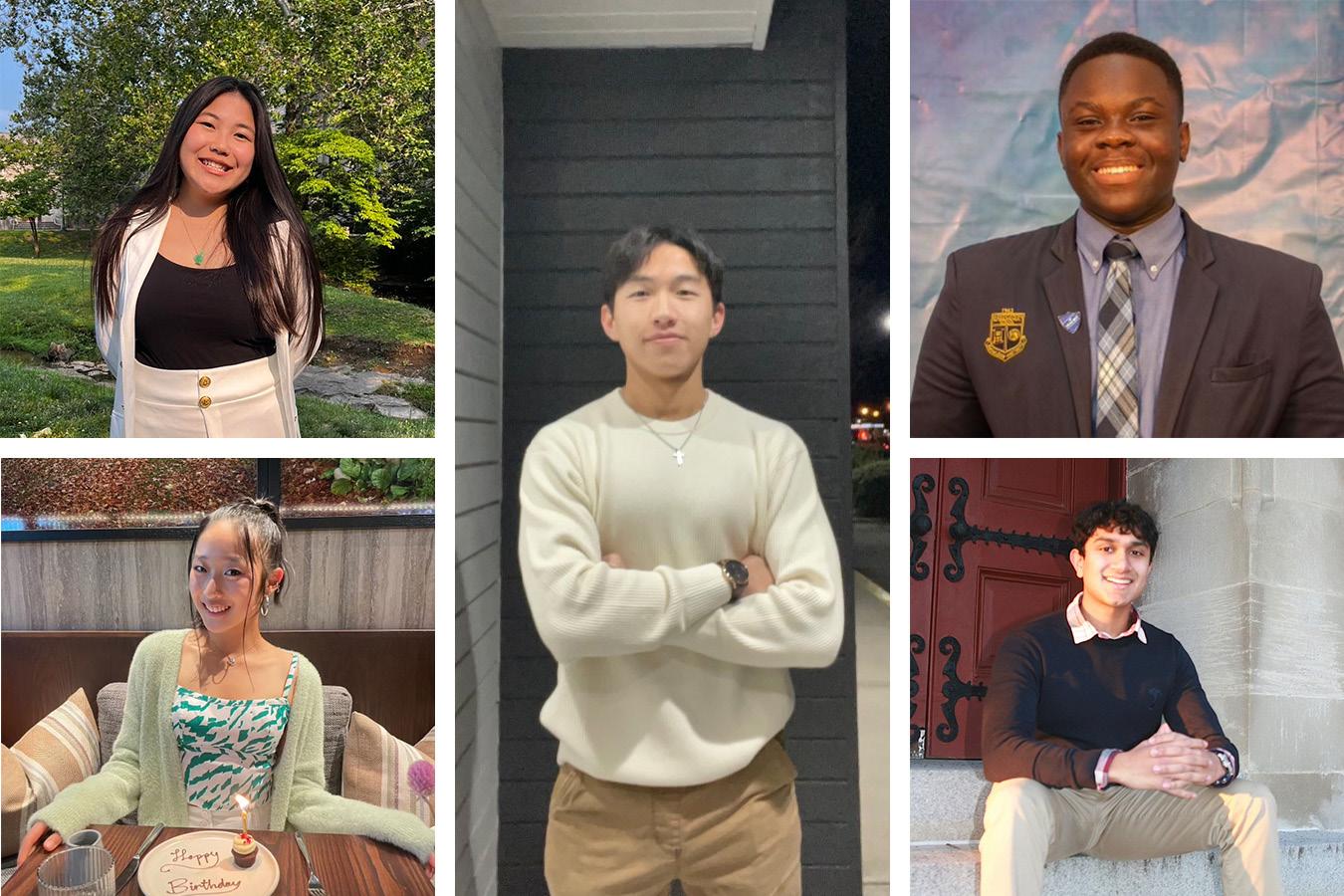
Penn released admissions results for its Early Decision program on Dec. 14, admitting roughly half of the Class of 2028.
Over 8,500 students applied to Penn through the Early Decision program this year — an increase from last year's totals, according to a University announcement. The admitted students hail from 68 countries and 41
states, though — as has been the case since the Class of 2026 — Penn did not immediately announce the early decision acceptance rate or demographic data.
The 2023-24 admissions cycle is the first since the Supreme Court’s landmark decision to overturn affirmative action, as well as the addition of school-specific
questions to the supplemental essay prompts.
The Daily Pennsylvanian sat down with five members of the Class of 2028 to speak with them about their backgrounds, aspirations, and what ultimately drew them to choose Penn.
Crystal Yeh is an incoming Wharton first-year from Cherry Hill, New Jersey. In her free time, she likes to
paint, draw, and participate in musical theater, especially through one-act plays. Yeh told the DP that she is excited to take advantage of Wharton’s new undergraduate concentration: Environmental, Social and Governance Factors for Business. She said that Penn's collaborative culture drew her to the University, where she is excited to
pursue her passion for business.
“I'm really looking forward to creating something new with my fellow Penn classmates. Whether that be in the form of a startup, with a research project, or even just sharing a meal,” she said. “I’m just so incredibly grateful to be a part of the Penn community now.”
Bryan Acheampong II,
6 QUAKER DAYS THURSDAY, APRIL 11, 2024 | THEDP.COM THE DAILY PENNSYLVANIAN
FIVE INCOMING FRESHMAN FROM THE CLASS OF 2028: CRYSTAL YEH (TOP LEFT), BRYAN ACHEAMPONG II (TOP RIGHT), ALLEN PHUONG (CENTER), TEESH LIANG (BOTTOM LEFT), AND JAI BAJAJ (BOTTOM RIGHT) (PHOTOS COURTESY OF CRYSTAL YEH, BRYAN ACHEAMPONG II, ALLEN PHUONG, TEESH LIANG, AND JAI BAJAJ))
who was born in Providence, Rhode Island but has lived most of his life in Accra, Ghana, will also be joining Wharton. He says he is most excited to explore Philadelphia, take advantage of Penn’s interdisciplinary opportunities, and explore various extracurriculars during his time on campus.
At home, Acheampong founded a business club modeled after Shark Tank and created a nonprofit initiative that delivers resources to orphans across Accra. He explained that these activities helped him discover his passion for finance and marketing.
“You have to find a way to get your initiatives out there so people can participate and become informed. It turned into a passion throughout the years,” he said.
Acheampong is also involved in acting, and was the male lead in his first play last year. He says he is looking forward to exploring new and old interests through the Penny Loafers, the Marketing Undergraduate Student Establishment, and various finance clubs.
He explained that the opportunities Penn offers to get involved in activities outside the classroom were most enticing to him when choosing the University.
“Where I'm from, we don't really have a lot of these clubs,” he said. “I’m honestly so excited.”
Teesh Liang is from Auckland, New Zealand, and is planning to study Communications in the College of
Arts and Sciences.
Liang said that she views communications as the best way to learn more about society and the best way to pursue her dream career of journalism.
“It’s really important to give a voice to the voiceless,” she said.
Liang has already graduated from high school and plans on expanding her nonprofit during her remaining time before arriving at Penn. Teesh is also a dancer and has worked with Paris Goble, an Emmy Award-winning choreographer, and hopes to continue dancing at Penn with the Pan-Asian Dance Troupe.
While Liang said it will be difficult to leave her family and friends in New Zealand, she is excited to explore new cultures, people, and places. She says that she is most excited for the way Penn allows for both professional and social opportunities.
“The fact that people at Penn come from all over the globe and are united in one single space is just so amazing,” she said. “We get to view life in such a different perspective.”
Jai Bajaj, an incoming School of Engineering and Applied Sciences first-year from Baltimore, Maryland, hails from an area much closer to Penn.
Bajaj said that nearly six years of coding experience have led him to pursue a major in computer science.
He explained that one of his favorite projects was an app he built that generated conversation through artificial
intelligence to help him and his friends talk to girls.
He intends for his Penn experience to encompass more than just coding, as he plays both squash and tennis and plans to get involved in Penn Aerospace Club to further his passion for physics.
Allen Phuong is an incoming first-year in the College of Arts and Sciences from Petaluma, California. He was drawn to Penn for its interdisciplinary offerings, extensive research opportunities, and urban environment as a home for his passion for neuroscience.
“I think what makes Penn such a great school are the students and the faculty,” he said. “So I trust that changing leadership will not significantly change Penn’s culture.”
Phuong says that his interest in neuroscience began when he held a cadaver’s brain in his hand, and that he hopes to gear his career toward working with children as a pediatrician.
Phuong, as the first in his family to attend college, said that the University’s resources for first-generation students, including Penn First Plus and the Pre First-Year Program, heavily influenced his decision to attend.
He also said that he hopes to participate in intramural sports to continue his interests in wrestling, swimming, and weightlifting. This fall, he said that he is most excited to try a Philly cheesesteak.



7 QUAKER DAYS THURSDAY, APRIL 11, 2024 THEDP.COM | THE DAILY PENNSYLVANIAN
Penn’s only intentionally satirical publication Penn’s only intentionally satirical publication EXTREMELY TRUE SUBSCRIBE TO OUR NEWSLETTER OR ELSE... RARELY ACCURATE UNDERTHEBUTTON.COM
Penn releases regular decision results for Class of 2028 after another record-breaking cycle
This marks the largest application pool in Penn's history and an increase of more than 10% from last year.
ALEX SLEN Staff Reporter
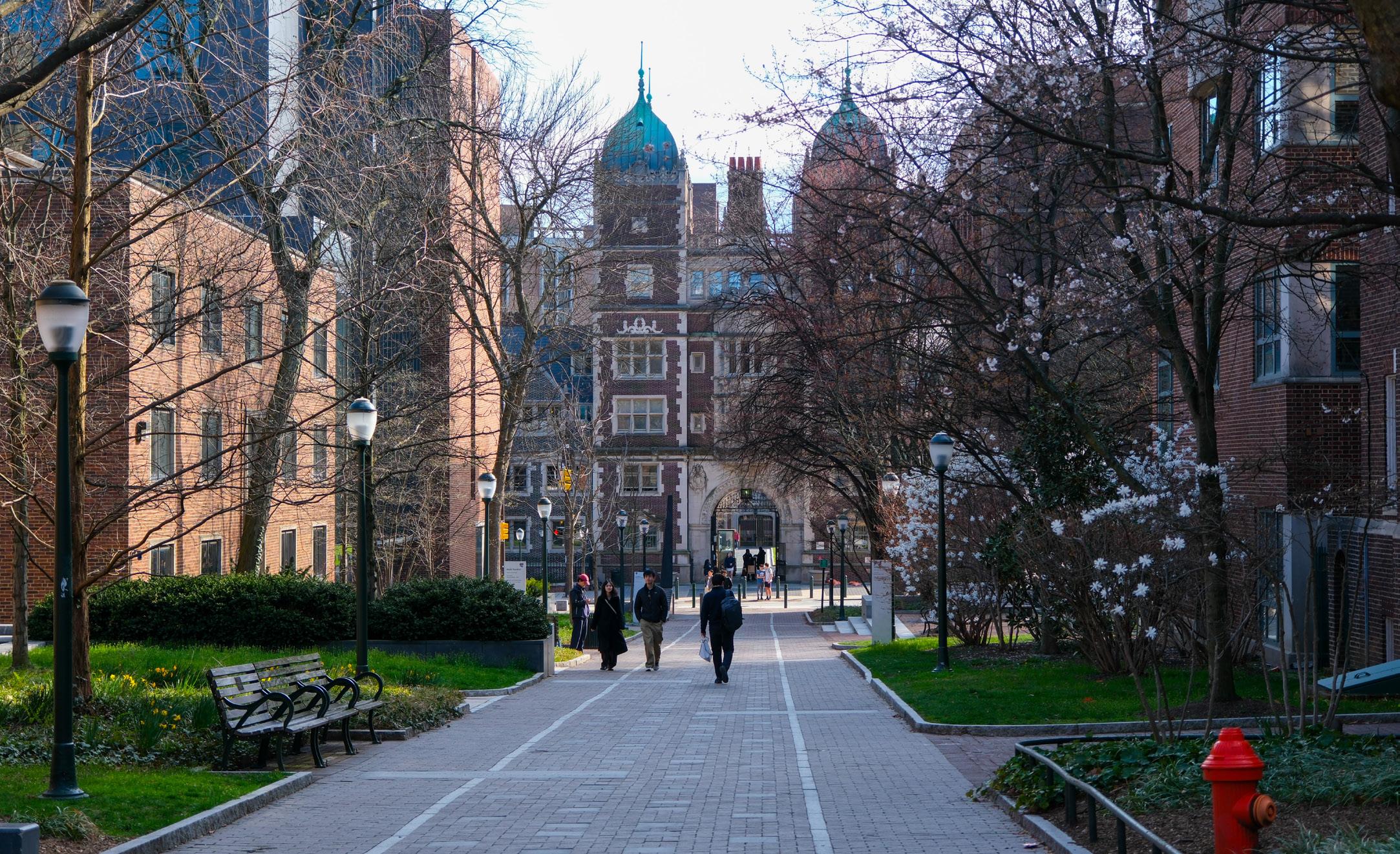
Penn announced regular decision admission results for the Class of 2028 after receiving a record number of applications for the second year in a row.
Students were informed of admissions decisions at 7 p.m. More than 65,000 students applied to Penn this year — marking the largest application pool in Penn's history and an increase of more than 10% from last year, with the Class of 2027 receiving over 59,000 applications.
This year's pool of admitted students includes students from 109 countries and all 50 states as well as Puerto Rico, U.S. Virgin Islands, Guam, Marshall Islands, and the military APO, according to a Penn Admissions press release. The Class of 2028 also includes one of the largest cohorts of students from Philadelphia.
Penn did not immediately share its acceptance rate or further demographic data for the Class of 2028, continuing a practice that began with the Class of 2026.
"This year's admitted class embodies Penn's tradition of academic and personal excellence across many dimensions," Vice Provost and Dean of Admissions Whitney Soule wrote in the announcement. "Through their applications, students shared intellectual pursuits already underway and those they hope to undertake with Penn's faculty and with each other when they arrive in the fall."
Last year, Penn admitted 3,474 students, resulting
in an overall acceptance rate of 5.8%. Class of 2027 includes students from 48 states and 97 countries. In a Board of Trustees meeting last June, Dean of Admissions Whitney Soule stated that first generation college students make up 19% of the admitted class, while 14% are legacy students.
Penn's record number of applicants comes after a tumultuous year for the university. Both former President Liz Magill and former Chair of the University Board of Trustees Scott Bok resigned due to mounting concerns from students, alumni, and lawmakers over antisemitism on campus.
In addition, this is the first full admissions cycle after the Supreme Court found race-conscious
admissions to be unconstitutional in a landmark ruling last June. Admissions Dean Whitney Soule said in an interview with the Pennsylvania Gazette that despite the ruling, "we are reading students with the full integration of complexity that they reveal about themselves."
Penn continued to be test-optional this admission cycle and recently announced that it will maintain the policy through the Class of 2029. Other Ivies announced a return to standardized testing requirements.
The application was changed slightly this year, with each undergraduate college having its own application question. They also replaced a question asking about academic in-
terest with a question about community involvement.
Penn kept the thank you letter prompt introduced last year. The prompt asks an applicant to write a thank you letter to a person who is important to them.
Finally, Penn is also continuing its policy of not requiring students to put down an enrollment deposit, a policy that started in the previous admissions cycle.
Admitted students have until May 1 to make their decisions.
"Each of these students exemplifies a unique combination of academic excellence, determination, curiosity, and joy," Soule wrote.
8 QUAKER DAYS THURSDAY, APRIL 11, 2024 | THEDP.COM THE DAILY PENNSYLVANIAN
PHOTO BY ABHIRAM JUVVADI
Penn receives record number of applications for Class of 2028 despite admin. turmoil
The Class of 2028 received 65,230 applications according to Interim Penn President Larry Jameson's stated remarks at a University Board of Trustees Meeting on March 1.
ETHAN YOUNG Staff Reporter
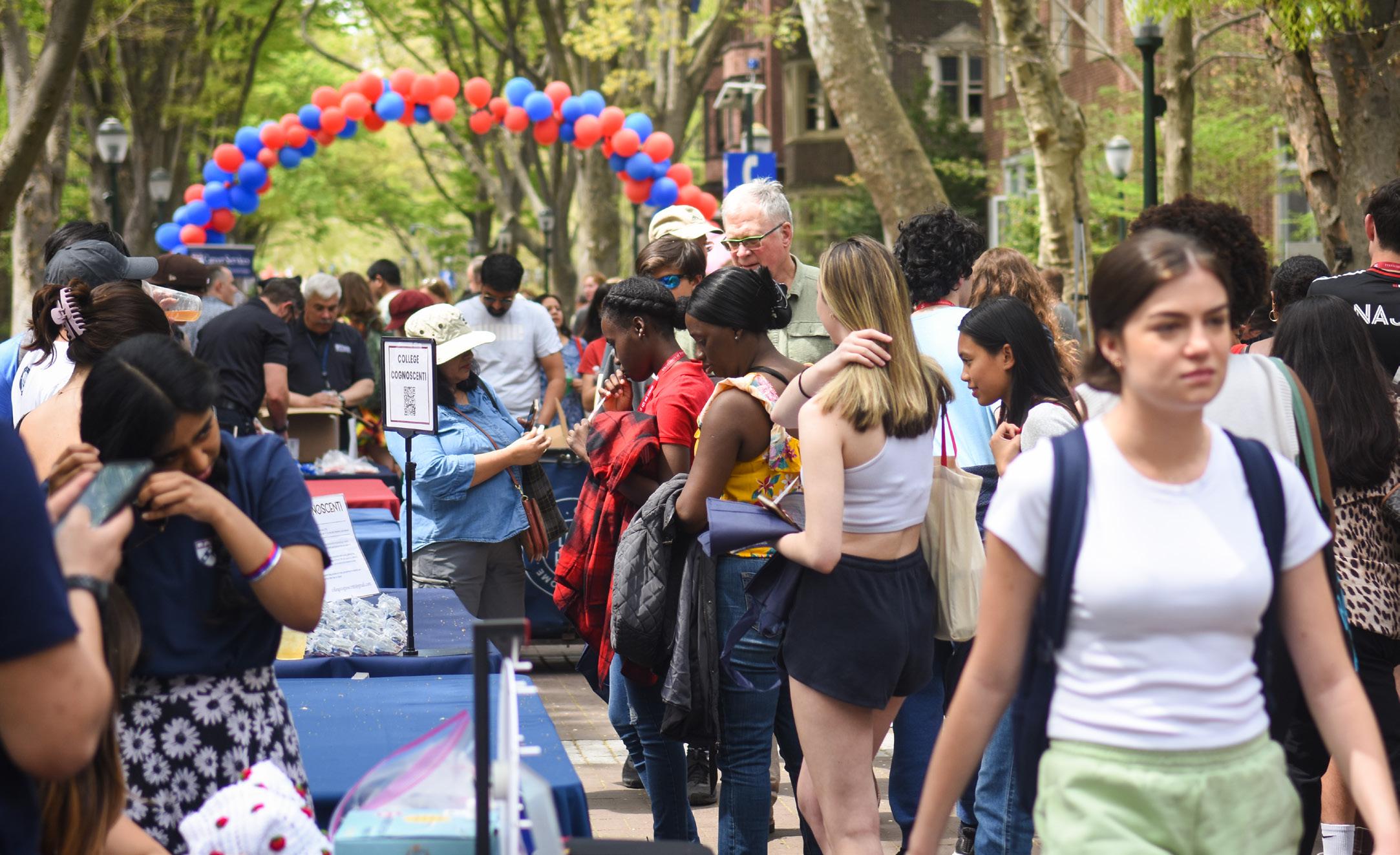
Penn received a record number of applications for the Class of 2028 despite campus leadership transitions and concerns over antisemitism and Islamophobia.
The Class of 2028 received 65,230 applications, according to Interim Penn President Larry Jameson's stated remarks at a University Board of Trustees Meeting on March 1. Over 8,500 of these students applied to Penn through the Early Decision program, according to an earlier University announcement. Applications are up more than 10% from the year prior — the Class of 2027 received more than 59,000 applications.
The increase in applications follows an unprecedented semester for the University. Both Penn's
president and Board of Trustees chair resigned in December, and many students expressed concerns about antisemitism and Islamophobia on campus throughout the fall semester.
This is also the first application cycle since the Supreme Court’s overturn of affirmative action last year.
In an interview with The Pennsylvania Gazette, Vice Provost and Dean of Admissions Whitney Soule shared that while admissions officers are not aware of an applicant's race throughout the application process, they still are “reading students with the full integration of complexity that they reveal about themselves.”
“The substance of how we think about reading the to-
tality of a student within an application and the information they provide to us to think about them as an individual—that part does feel familiar,” Soule added. “What is different, though, is that we can’t know the racial or ethnic makeup of the class that we are intending to admit, and what that might represent for the students who enroll."
While Penn saw an increase in applications, other Ivy League institutions did not, at least in the early admissions cycle. Harvard University saw a 17% decrease in early action applications and Brown University saw a 5% decrease in total applications from last year.
Penn made several changes to its application for the 2023-24 admissions cycle.
An essay prompt unique to each undergraduate school was added to the application on July 31, a transition from the previous single short answer used for all four schools.
The application also removed a question about applicants’ intended area of study while adding one about campus group involvement.
Penn also added a new application the admissions cycle for the Class of 2027, asking students to write a thank you note to someone they had not thanked and wanted to acknowledge. In her interview with The Pennsylvania Gazette, Soule described reading these notes as "one of the most favorite experiences" of her years working in higher education.
"It was one of the most unbelievable experiences to read those thank-you notes, because they were all so genuine and personal," Soule said.
Penn announced on March 5 that it was extending its test-optional application policy for the 2024-25 admissions cycle, despite other institutions reinstating standardized testing requirements. This decision defied decisions made by several other Ivies, as — in the weeks preceding Penn's announcement — Brown, Dartmouth, and Yale all implemented standardized testing requirements.
Regular decision applicants to Penn will receive their admissions decisions by April 1.
9 QUAKER DAYS THURSDAY, APRIL 11, 2024 THEDP.COM | THE DAILY PENNSYLVANIAN
PHOTO BY BENJAMIN MCAVOY-BICKFORD
Penn to raise tuition by 3.9%, approves record financial aid budget
The Penn Board of Trustees approved a 3.9% tuition hike for the 2024-25 academic year.
NEEMA BADDAM Senior Reporter
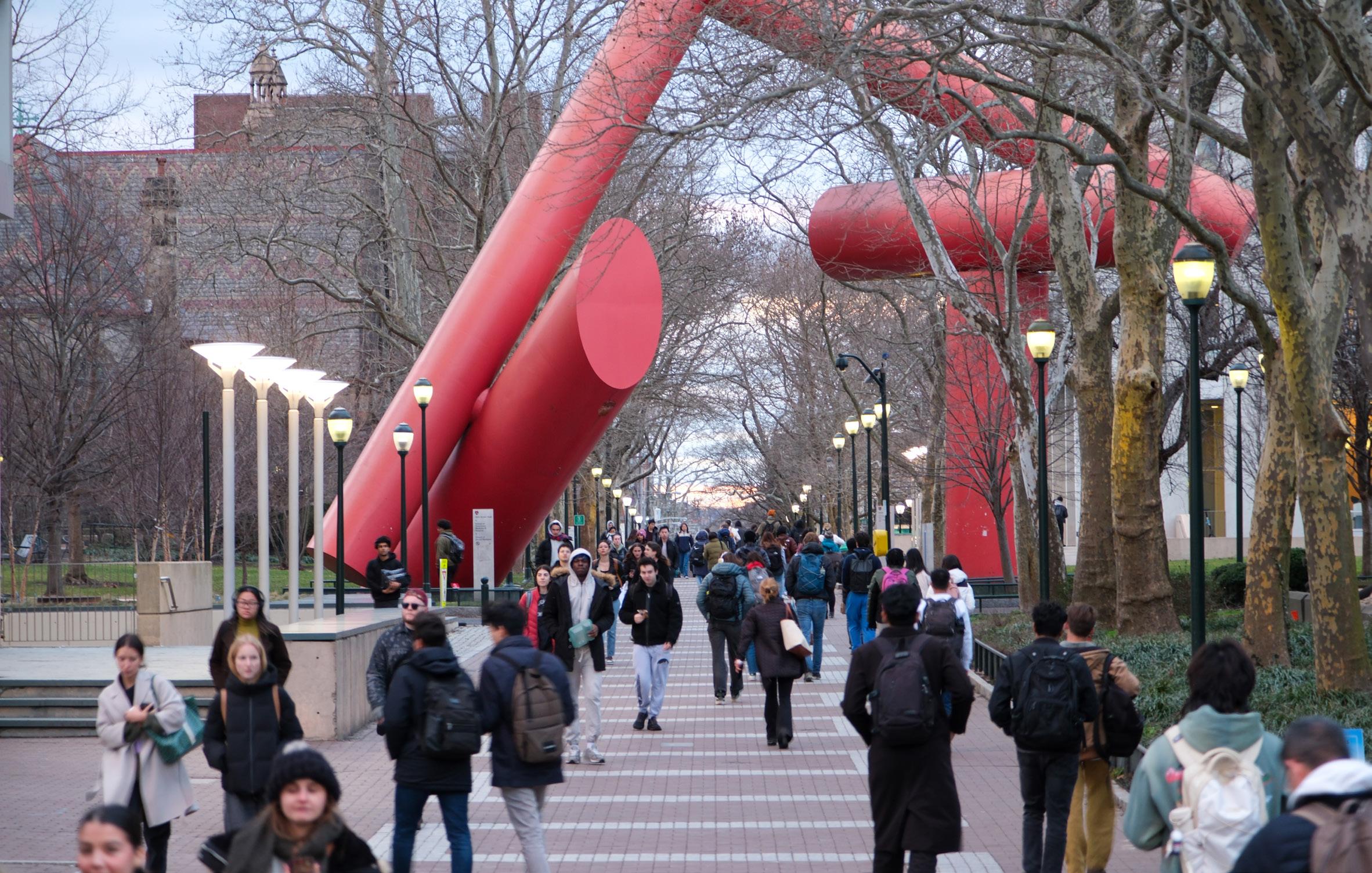
The Penn Board of Trustees approved a 3.9% tuition hike for the 2024-25 academic year along with an increase in the undergraduate financial aid budget to a record $311 million.
At a University Board of Trustees meeting on Feb. 29, administrators announced that the total cost of attendance will increase from $84,600 to $87,860. Tuition will increase from $58,620 to $60,920, fees from $7,484 to $7,766, and room and board from $18,496 to $19,174.
“Measured increases in tuition and fees reflect the increasing annual costs of delivering a Penn education, such as employing
a world-class faculty and staff, expanding interdisciplinary academic programs, offering the largest no-loan undergraduate financial aid program of its kind, and accounting for inflationary cost increases across many operating expense categories,” the University wrote in a statement.
The tuition hike is in line with those of other Ivy League universities who have announced their 2024-25 academic costs so far, with Yale reporting a 3.9% tuition increase and Brown coming in at a 4.5% increase. In addition, Stanford announced a 5.5% increase in tuition for the 2024-2025 school year,
cementing Penn's position in the “middle of the pack” of its peer institutions with regard to tuition and charges increases, according to administrators at the meeting.
They also announced that the total revenue from tuition and fees in the 2024 fiscal year amounted to $1.804 billion.
Accompanying the tuition rise is a 4.5% increase in the undergraduate financial aid budget. The average financial aid package currently totals $66,764, which covers 75% of the entire cost of attendance. This year, 46% of individuals received need-based financial aid without loans from Penn.
“Even as the cost of tuition increases over time, the average net cost for an aided student to attend Penn has held relatively steady since launching our grant-based, no-loan financial aid program in 2008,” Vice President for Finance and Treasurer Mark Dingfield said. “In fact, when adjusted for inflation, that net cost has actually decreased by about 26% in constant 2008 dollars.”
Last year, there was an 11.1% increase in the financial aid budget — the largest financial aid expansion in the past decade. The eligibility threshold for full financial aid packages rose to $75,000 from $65,500
for 2023-2024 — making students from families making $75,000 or less per year eligible for free tuition, fees, housing, and dining as well as grants and work-study funds. The percentage of Pell recipients among undergraduates also increased to a new high of 17.3%.
At the meeting, administrators called last year’s threshold increase part of Penn’s “continuous investment in undergraduate student experience.” This year’s contribution towards that goal will be an investment in a Student Performing Arts Center, with construction beginning in the fall.
10 QUAKER DAYS THURSDAY, APRIL 11, 2024 | THEDP.COM THE DAILY PENNSYLVANIAN
PHOTO BY ABHIRAM JUVVADI
Penn Division of Finance, incoming students reflect on FAFSA changes for ongoing application cycle
The changes include shortening the list of questions by more than half, moving back the date the form becomes available, and no longer considering the number of the applicant's siblings attending other universities.
NICOLE MURAVSKY Staff Reporter
The Free Application for Federal Student Aid launched with several major changes for the 2024-2025 academic year.
The changes include shortening the list of questions by more than half, moving back the date the form becomes available, and no longer considering the number of the applicant's siblings attending other universities. The Daily Pennsylvanian spoke with Penn's Director of Finance Administration and Communications Paul Richards — as well as incoming Penn students who applied for financial aid — to learn how the changes to the FAFSA are affecting applicants this admissions cycle.
In previous years, the FAFSA form became available on Oct. 1. The application this year opened in December after early decision applications closed on Nov. 1. Penn Admissions has stated that the shifted timeline will not impact students' ability to apply for financial aid at Penn.
Richards told the DP that the FAFSA simply determines if a student is eligible for federal financial aid. Penn will still provide institutional aid for a student who is not eligible for federal aid or whose award does not meet their full demonstrated financial need.
Penn Student Registration & Financial Services and Penn Admissions encouraged students to submit their financial aid requirements — including their CSS Profile and relevant tax returns — by the posted deadline, according to Richards. He said that students will receive a guaranteed financial aid letter with their admissions decisions.
While the Student Aid Index no longer asks how many of the student's siblings are enrolled in other universities, Penn will continue to consider that factor in its calculation of demonstrated need. Additionally, the number of members in a student’s household who are in college will not be factored into the Student Aid Index of the FASFA. These changes apply to both undergraduate and graduate students.
Richards said that with the streamlined form, the federal government can still obtain the necessary financial information to determine a student’s eligibility for federal funds.
“You can get a good enough picture of a family’s financial circumstances with a small number of questions,” Richards said. “No one ever needed that much information in the first place. The fact that they were asking 108 questions was deemed excessive.”
Incoming College
first-year Cristiah Denise Somoray said that the new form was simpler than she expected. She said that she filled out her financial aid application and FASFA form by herself, as her parents are from the Philippines and are not familiar with the financial aid pro-
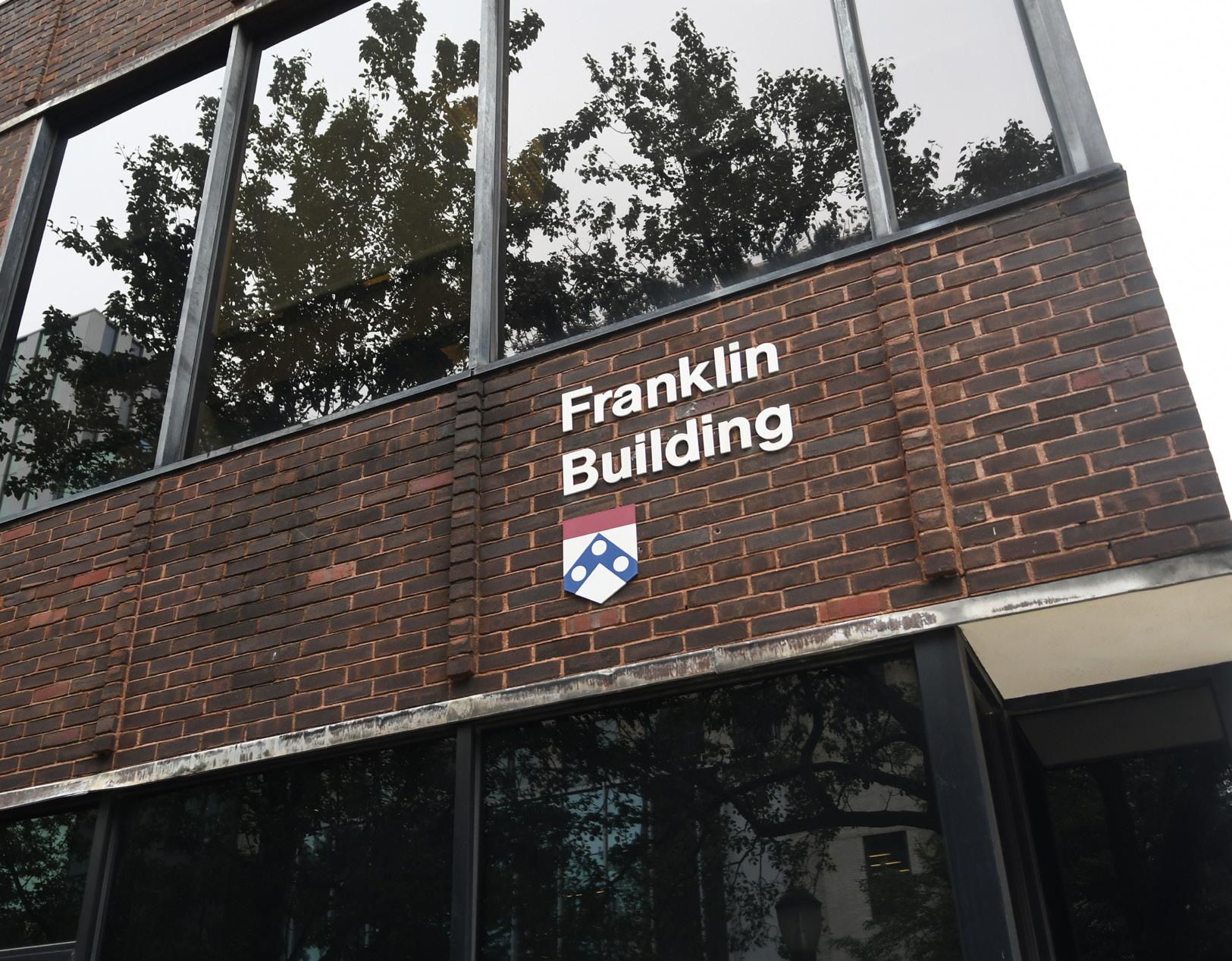
cess in the United States.
“I knew that they were shortening the FASFA, but I wasn’t expecting it to be that short. It definitely made me think, ‘Did I completely miss something, or did I fill this out wrong?’ because it flew by so quickly,” Somoray said.
In contrast, incoming College first-year Abby Hyken said that that completing the form was still a lengthy process.
“I remember hearing from older friends that it was such a long and tedious process,” Hyken said. “I still feel like it took a considerable amount of time. I can’t even imagine what it would have been like before they simplified it.”
Unlike Penn, some universities that only package federal aid for students use the FASFA as the sole source of information to learn more about a student’s financial need. Richards said that students who apply to these institutions
within the early decision period may not know what aid they are eligible for and thus can struggle deciding which school to commit to.
Incoming College first year Suyash Dwivedi told the DP that he has not yet received his financial aid packages from schools that he applied to within his home state of Georgia. Instead, he relied on online financial aid calculators to estimate how much he would receive from those institutions.
Dwivedi said that it gave him a sense of “security” to know that he would be “getting aid for sure” from Penn’s institutional budget.
The undergraduate financial aid budget for the 2023-2024 academic year was $286 million. The financial aid budget for 2024-2025 will be announced at the University Board of Trustees meeting from Feb. 29 - March 1.
Even though the FASFA will not change the amount
of financial aid that a student will receive, Richards emphasized the importance of filling out the form.
“It’s definitely not of no consequence to students, because the institution relies on having access to that federal aid to add into financial aid packages,” Richards said. “When students do receive federal aid, that frees up the institutional aid that can be distributed to more students.”
SRFS is partnering with the various schools to develop a series of workshops and host drop-in sessions for students who want help with the FASFA.
“We’re trying to tackle it from a lot of different angles to make sure that if anyone is having a problem, that there’s a way to get them help,” Richards said.
“We’re in a position to be able to guarantee to students that yes, we will meet your financial need, and yes, we can tell you what that is right now.”
11 QUAKER DAYS THURSDAY, APRIL 11, 2024 THEDP.COM | THE DAILY PENNSYLVANIAN
PHOTO BY CYNTHIA DONG

Penn’s Concealed Aid
The game–changing tuition assistance that remains exclusive and under–advertised.
CHARISSA HOWARD Focus Beat
If you know a good amount of Penn students who hail from Philadelphia, chances are high that at least one of them has a parent who works here. Why would anyone want to risk running into their parents on Locust Walk, you may ask? For many, the answer can be found in Penn’s tuition benefits.
Penn’s benefits are, frankly, pretty great. Calling their rewards package “one of the most competitive in higher education,” a statement on Penn's HR department’s website boasts of home ownership services, health coverage, retirement savings plans, and of course, tuition benefits that have the potential to be life–changing for Penn employees. While there are a handful of small–print restrictions (one can only be eligible for the child tuition benefits after three years of eligible service at Penn, for example), for the most part, these benefits are seemingly designed to be accessible for all full–time faculty and staff.
Some are happily utilizing these perks. “I did early decision here because of the benefit,” College sophomore Hina Sako recalls. Hina’s father, Masao Sako, is a

standing faculty member within the physics department and, as she was beginning to apply to colleges, he put it on her radar that if she went to Penn, it’d save her family quite a bit of money. Penn’s tuition benefit for children of faculty and staff members covers 75% of Penn’s undergraduate tuition and technology costs. Even if Hina had chosen to go to a school other than Penn, 40% of Penn's tuition rate would have been covered as well, based on the sheer fact that her dad works at Penn.
Meanwhile, Sarah Ropp, the dialogue director for the SNF Paideia program, utilizes Penn’s tuition benefits in a different way: she herself is a student in a Penn Greek class. Ropp, who has a Ph.D. in comparative literature and is a self–proclaimed lover of language learning, went
to Athens last summer for the annual Paideia trip and decided that she wanted to learn Greek for future trips that she will take. Through the tuition benefit, Ropp has been able to take this class at the College of Liberal and Professional Studies completely for free. Ropp enthuses about how valuable the opportunity is and how great it is “to tell my students that I am also a student.”
For others, however, learning about the tuition benefit was a lot less straightforward.
If you’ve been in Houston Hall more than a handful of times, you’ve probably heard Julian Lawrence’s voice encouraging a fellow employee or bantering with an NBA fan about the Lakers’ prospects for the season. While Lawrence's official job title is Operations
Associate, he describes his position as doing a little bit of everything, from managing Houston Hall to organizing and coordinating events within the building.
This will be Lawrence's 11th year working here at Penn. He started out working in Houston Market and credits the tight–knit community of the staff at Houston,mentors who took an interest in his future, for the position he is in today.
Still, he thinks of himself as more of the exception than the rule when it comes to upward mobility at Penn as a staff member.
Penn has about 2,800 standing faculty but well over 14,000 staff members. The standing faculty count remains overwhelmingly white and male, a demographic traditionally overrepresented within academia. Within the staff, meanwhile, there’s a signifi-
cantly higher percentage of Black, Latinx, and female workers. While it’s certainly possible to get hired at Penn regardless of who you are, “It’s a way tougher road than if you have the credentials and have a lot of the paperwork behind you,” Lawrence, who does not have a college degree, observes.
College is something that Lawrence wants to ensure is an option for his children, especially given the pathways for economic mobility that it grants. But college is an expensive option. As his eldest son started applying to schools, Lawrence began looking for ways to finance his education. One day, while talking with a faculty member about the stress of paying for college, the faculty member asked him if he’d heard of the tuition benefit. Lawrence immediately began to dig
12 QUAKER DAYS THURSDAY, APRIL 11, 2024 | 34ST.COM 34TH STREET MAGAZINE
PHOTO BY JEAN PARK
through the HR website and was shocked. “I’m like ‘Why didn’t they tell us about this?!’” Lawrence remembered. He’d been informed of the existence of benefits during his onboarding, but 11 years ago is a long time. “There’s so much we’re doing all day,” Lawrence told me, “so we can easily forget about something like [the tuition benefit].”
Thanks to that conversation with the faculty member and his research, Lawrence was able to gain access to the tuition benefit just in time, completely changing his family’s financial perspective when it came to paying for college. But it got him thinking: Why wasn’t this something that he’d been reinformed of by HR?
Talking to his staff, Lawrence found that the majority were just barely aware of the benefits and definitely weren’t using them. “They’re just like ‘Oh yeah, it’s benefits,’ and they don’t know what it is,” Lawrence said, adding that for all his staff members know, the benefits “could be $5 off at Chipotle.”
And even when staff and faculty are made aware of the benefits, there are further problems when it comes to their accessibility. When looking into her Greek class, Ropp experienced a lot of confusion around enrollment. Though she had recently started at Penn, she was told she would be okay to take the class. But just a few days before the class began, HR reached back out to tell her that, due to how recently she’d started within a benefits–eligible position, she would have to start her Greek class a semester later than she’d planned. It was disappointing for Ropp, as she had been planning to take the class with a colleague, and now she’d have to play catch–up to get on the same level as this
coworker.
“[The benefit is] not easy to understand from the website. It’s hard to tell exactly what it covers, how many courses, at what time, for whom,” Ropp notes.
Right now, the bulk of the information about the tuition benefit is given to staff members through the website (and, last year, a singular mailed postcard). They are forced to find out the rest through word of mouth, like Lawrence with the faculty member who told him about the benefit.
Penn purports to foster “inclusive excellence” and yet, they are ignoring the perfect chance to do this — through better advertising of the accessible pathways to higher education that they offer to the (much more diverse) portion of their workers that aren’t already ingrained within higher education as professors.
My parents are also both faculty members at Penn. Like Hina, I am enrolled here under the tuition benefit, something that is easing a large financial burden off of my family, especially given that I have two younger sisters who both plan to go to college. Unlike the experience of Lawrence and his staff, the tuition benefit was something my parents were constantly being reminded of because so many of their colleagues with older children were reporting utilizing it.
College was always something that was a given for me. Even though they wanted me close, my parents told me that I could go to school anywhere that I liked. I was able to dream about taking classes by the beach in California or in the mountains of Colorado (before ultimately deciding that I didn’t want to leave Philadelphia just yet after all). As I’ve grown older, I’ve realized just how much of a privilege this
was—all of this granted to me because my parents were comfortably aware of Penn’s tuition benefit.
It is impossible to find out how many staff members are utilizing the tuition benefit. When I reached out to Penn HR asking about statistics, they told me they consider the information “confidential and proprietary.” However, based on conversations with staff members, there is a lot more that Penn could be doing to make all of its workers aware of the benefits that they offer.
Lawrence doesn’t think advertising the benefits and what they entail would be too difficult to do. He and his staff members are constantly made to check their Outlook calendars and email accounts, where their schedules and University messaging are included. Perhaps reminders to check the benefits could be included there every so often, he suggests. Anything that involves expanding information about tuition benefits from just a corner of the HR website, something that many do not have the time or recall to regularly check.
Imagine how much of a gift Penn would be giving to families simply by advertis ing their tuition benefits to their eligible workers, and in particular, their staff members. The effects could be revolutionary.
34th Street Magazine is Penn's first arts and culture magazine. We’re West Philadelphia’s authority of taste; we tell campus what albums to listen to, restaurants to try, and clubs to put on their radar. Street is also Penn’s go-to hub for social responsibility and activism on campus with features that investigate problems within Student Intervention Services, explainers about Penn’s $10 million donation to Philadelphia public schools, and profiles on students who are making waves by changing our status quo.

Subscribe to see what’s toastin’ every Monday - Wednesday Friday





13 QUAKER DAYS THURSDAY, APRIL 11, 2024 34ST.COM | 34TH STREET MAGAZINE
@34STMAG
US ON INSTAGRAM!
FOLLOW
Five easy classes to take in the fall 2024 semester
GRETTA MAGUIRE Senior Reporter
Are you still seeking out one final class to complete your spring 2024 schedule? Look no further, as The Daily Pennsylvanian has collected a list of easy classes for next semester — all of which have difficulty ratings of less than 2.1, according to Penn Course Review.
ITAL 1900: Italian History on Screen: How Movies Tell the Story of Italy
This class, taught by Filippo Trentin, will delve into the portrayal of Italy on screen throughout history and in the present day. It will include reading literary and historical texts and watching movies — and all lectures and readings are in English.
With a 1.90 difficulty on Penn Course Review, it fulfills both the CrossCultural Analysis and Arts and Letters requirements in the College of Arts and Sciences. It is cross-listed with the Cinema and Media Studies Department, and will be held from 1:453:15 p.m. on Tuesdays and Thursdays.
Trentin has previously worked as a postdoctoral fellow at the ICI Berlin Institute of Cultural Inquiry from 2013 to 2015. Trentin’s research interests include 20th-century Italian literature and cinema, queer studies, and psychoanalysis.
ANTH 1238: Introduction to Medical Anthropology
This introductory course — which will be taught by
Emily Ng — focuses on applying central concepts of anthropology to human health and illness with a focus placed on contemporary applications. It is cross-listed between the Anthropology and Health and Societies Departments.
The course's lecture section will be held from 1:45 - 2:45 p.m. on Mondays and Wednesdays, and students are also required to register for a recitation section.
Although not yet reviewed for Ng, previous Penn Course Reviews have included difficulty levels of 1.92 and 1.80.
ENGL 0755: Listening in Trying Times
This Stavros Niarchos Foundation Paideia course will be taught by Aaron Levy and focus on connecting with other spaces and times through the theories and histories of listening. Its description on Path at Penn calls listening “an essential skill that can help us find solace and community together, connecting what is singular in us with what
Wharton executive education introduces ‘People Management for Emerging Leaders’ course
From Sep. 3 to Oct. 15, 2024, Wharton Executive Education will host a live, online program titled People Management for Emerging Leaders.
JAKE KONIGSBERG Contributing Reporter
Wharton Executive Education will host a live, online leadership program next fall.
People Management for Emerging Leaders will run from Sept. 3 to Oct. 15, teaching management
skills to managers hoping to improve their leadership skills and others hoping to assume managerial roles in the future. It is part of Wharton Executive Education, a program run by the Wharton School that teaches over 100,000 individuals every year.
This new program is a response to a recent article by Forbes, which discussed the lack of proper management experience and training for newly promoted supervisors.
“Bad supervising really hurts the organization be-
binds us to another.”
The course — which will meet once a week on Wednesdays from 12 - 2:59 p.m., and has seats for fifteen students — has a Penn Course Review difficulty rating of 1.33.
FNAR 0020: Contemporary Art Studio
This class will be taught by Matthew Neff and is an introduction to studiobased art practices. It will include numerous multidisciplinary projects, and will include visiting lectures and field trips. It has a Penn Course review difficulty level of 1.44.
The class, which has 12 available seats for students, is offered from 1:45 - 4:45 p.m. on Mondays and Wednesdays.
Neff is the director of the undergraduate program in Fine Arts and his artistic
work focuses on power negotiations of both the present and past.
SAST 0001: Introduction to Modern India
This course, which is taught by Daud Ali, is cross listed between both the South Asian Studies and History departments. It will focus on Indian history from the 16th through 21st centuries and multiple themes, including trade between India and the West in the 17th century, the creation of the Indian middle class, and India's nuclearization.
The course will be taught from 12 - 1:29 p.m. on Mondays and Wednesdays. It has a difficulty rating of 2.02 and counts for both the Cross Cultural Analysis and History & Tradition College requirements.
cause employees aren’t just going to take it — they’re going to leave,” Program Director Peter Cappelli said. “It’s a tight labor market now, so people can quit if they want.”
The program, which will have a hybrid of live online sessions and self-paced modules, covers seven main topics ranging from stepping into a managerial role to effective ways to communicate as a manager. Program sessions will be taught by Wharton faculty, such as Cappelli, William and Jacalyn Egan Professor
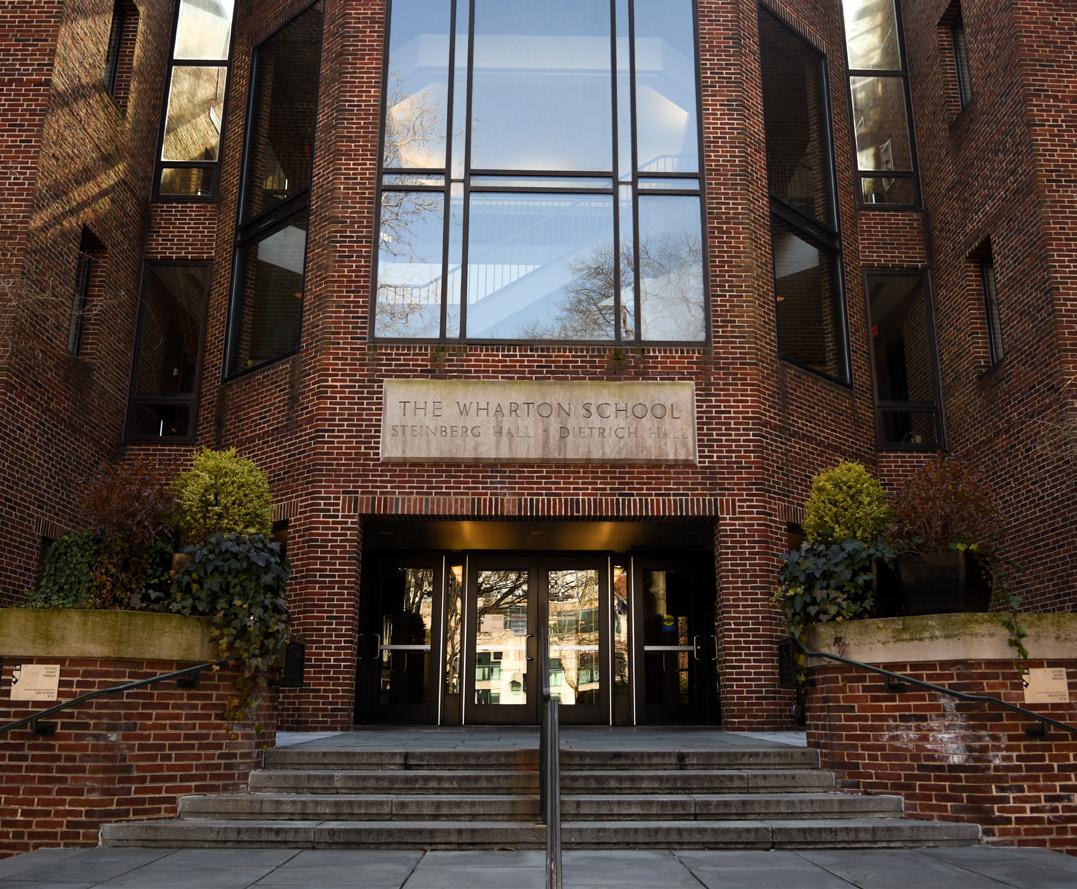
Amy Wrzesniewski, and management communication consultant Lisa Warshaw.
Cappelli, who is also the director of Wharton's Center for Human Resources, pointed out that accessible training for managers improves organizations as a whole. The program will put emphasis on managing difficult employees and utilizing methods like roleplaying and peer feedback. The course has been tailored to apply to a large au-
dience, with recommended audiences including those newly entering managerial roles, those struggling in current managerial roles, entrepreneurs, and aspiring managers.
“This program is for firsttime managers, for sure, but it’s not limited to that. It's for anybody who is trying to get better at managing people,” Cappelli said.
The program is currently accepting applications with a fee of $5,500 for participation.
14 QUAKER DAYS THURSDAY, APRIL 11, 2024 | THEDP.COM THE DAILY PENNSYLVANIAN
PHOTO BY CALEB CRAIN
Follow us on Instagram for news, giveaways, and more!




15 QUAKER DAYS THURSDAY, APRIL 11, 2024 THEDP.COM | THE DAILY PENNSYLVANIAN
dailypenn
Africana Studies class studies history of Black students, faculty, and staff at Penn
The professors who teach AFRC 1187 and students currently enrolled spoke with The Daily Pennsylvanian about why the class is important.
ELEA CASTIGLIONE AND MAX ANNUNZIATA Senior Reporter and Staff Reporter

“A transformative experience” is how students describe one Africana Studies class that explores Black history, culture and life at Penn and beyond.
AFRC 1187: “The History of People of African Descent at the University of Pennsylvania” focuses on the stories of Black individuals on campus and around the world, drawing on University texts and archival records. Professors and students currently enrolled spoke with The Daily Pennsylvanian about how the course impacted their experience at Penn. The class is co-taught by 2000 College graduate and University Chaplain Rev.
Charles Howard and 1998 Wharton graduate and Director of Penn Spectrum
Programs & Shared Interest Groups Daina Richie-Troy. Students visit the Penn Archives, conduct interviews, and hear from guest speakers to imagine what the University was like at different points in history, according to Brian Peterson, the director of Makuu: The Black Cultural Center. Peterson wrote in a statement to the DP that Howard brought the idea for the class to him 15 years ago. He originally co-taught the class with Howard, and Richie-Troy joined as a teaching assistant and later a co-teacher.
“[AFRC 1187] helps students think more critically about their current Penn experience and what they want to see,” Peterson wrote. “It’s brought to-
gether students of all backgrounds, and has created opportunities to think about other seminars and ideas to reach other communities.”
Richie-Troy became involved in the class after attending a few sessions with students she knew in her former role as associate director of Makuu. She said that Howard and Peterson taught Penn's Black history in a way she had “never been introduced to before.”
“The way the class is framed is finding people who have been involved and walked the halls [of Penn] from the beginning, but also talking about where society was at the time,” RichieTroy said in an interview.
College senior Taussia Boadi, who is currently taking AFRC 1187, said that the
course has been on her list of classes to take while at Penn since before her first year.
“I'm learning about my people and being taught by my people,” Boadi said. “I think that's really important because in history in high school, I was being taught about Black people by white people. And they will never be able to fully articulate the true experiences.”
Lynn Larabi, a senior in the College, took the class during the spring of her first year. She described the class as “a working and interactive archive” of Penn stories.
Students in the class are able to explore a wide range of topics. In past classes, students have compiled guides to Penn that talk
about elements of Black life that “may not be in a brochure,” according to RichieTroy. Previous students have explored questions like “Where's your favorite place to get a Jamaican patty? Where do you get your haircut? If you want to go to a drum circle, where do you go?”
When she took the class, Larabi was able to look into the founding of predominantly Black student groups on campus that she belongs to, including The Inspiration Acapella and senior honor society Onyx.
She is currently the class’s TA for the second time, and told the DP that she returned to this course because “there's always something new [to learn].”
“We’ve had these really
16 QUAKER DAYS THURSDAY, APRIL 11, 2024 | THEDP.COM THE DAILY PENNSYLVANIAN
DP FILE PHOTO
great narratives told over time about what it's like to be in different pockets at Penn,” she added.
Boadi explained that the class has helped her reflect on her experience at Penn more holistically, informing her independent study project.
“Coming into Penn, I really hated my natural hair. I felt as though it wasn't professional enough, and I felt as though I wouldn't be taken seriously,” Boadi said. “I'm a Black woman and I didn't want to stand out more in this space that wasn't made for me.”
“As I entered my sophomore and junior year, I was like, whoa, like, [I] actually really love my hair. Why have I been trying to hide it?” she continued.
Her project, titled “Strandscendence: A Historical Odyssey of Black Hair Narratives and Campus Resilience,” explores the development of people's relationship with their hair in college, specifically at a predominantly white institution.
College senior Tarah Paul used her project to research 1985 College graduate and former chairman of Penn’s Black Student League Dr. Dwayne Everett.
In collaboration with a classmate, Paul searched the Penn archives for information on Everett. While Everett’s name often appeared in old DP articles, they struggled to find information on him until coming across him in an old yearbook.
Paul said that she and her classmate aimed to honor Everett, which made the project enjoyable. Everett eventually visited the class on their invitation and told stories from his time at Penn.
Paul added that the course partly contributed to the 2022 revival of a Black student publication at Penn, Faces of Black Penn,
of which she is co-editor. She explained that The Vision Newspaper, which was the focus of a project by students in AFRC 1187, served as an inspiration for the new magazine.
“Because I'm able to honor the Black population at Penn, I'm also able to look around and say who was accounted for and who isn't accounted for," RichieTroy said about the class.
Boadi said that the class has been a way to learn more about the history of the University she attends, understanding where she comes from and "where we should be going."
For Larabi, AFRC 1187 was a place for “thinking critically about what it means to be at Penn and what your impact as a student can look like.”
Richie-Troy explained that, initially, most of the students enrolled in the class were Black undergraduate students, but as more students heard about the class, it became more diverse. Graduate students and alumni have also historically been able to audit the class, which Richie-Troy said has introduced them to “an element of Penn that they didn't get while they were here.”
Paul said that taking AFRC 1187 was a “transformative experience," and the focus on Black Penn alumni introduced her to new stories she would never been aware of.
Boadi encouraged more students to take AFRC 1187, explaining that it “provides the necessary history that we need to appreciate the people who walk around this campus.”
“This is a class for everyone. It's a class to learn, and to share, and to understand, and to listen and gain empathy, which is something I think we lack a lot at Penn,” she said.
AFRC 1187 is offered every spring.
Penn students left 'panicked and puzzled' by competitive Wharton club application process
Students voiced frustration about clubs prioritizing personal connections and technical abilities.
The semesterly process of applying to Wharton clubs is stressful, competitive, and often unfair, multiple students told The Daily Pennsylvanian — despite recent efforts to regulate the application process. Students have previously voiced frustration to the DP about clubs with singledigit acceptance rates and multi-stage application processes, particularly when looking to meet new people and learn more about chosen interests. Written applications typically precede one to two rounds of evaluative interviews before clubs notify applicants of their decisions, according to students.
The written portion of the standardized spring club application process for Wharton clubs closed on Feb. 2.
The Wharton Council, which regulates Wharton club recruitment, has made efforts to make the application process more equitable over the past several years. Regulations implemented include a standardized application, uniform decision notification dates, and restrictions on conducting group interviews.
Wharton senior Erin Feng — the co-President of Global Research Consulting — told the DP that the club receives in excess of 100 to 200 applications each cycle.
The club currently has 70 active members, according to its website. She said that their team reviews applica-
JAMIE KIM Staff Reporter
tions on an objective scoring system based on both behavioral and technical elements.
Wharton senior and GRC co-President Shana Ahemode additionally told the DP that the club hosts wellness events and workshops to help applicants prepare for the technical portion of the interview process.
However, students say some clubs have implemented processes that circumvent these initiatives by turning to personal connections.
“It’s very reliant on who you know,” Huntsman Program first year Shubham Dixit — who applied for clubs this application cycle — said. He felt that optional coffee chats were an additional evaluative round in the recruitment process.
Dixit added that clubs that encouraged students without previous experience to apply seemed to evaluate technical abilities through all parts of their recruitment processes.
“It honestly just left me really panicked and puzzled,” Dixit said.
Others described the process as random, stating that club applications have become a game of volume rather than a way to pursue true interest.
Wharton first year Sakyo Maeda — who also applied to various consulting clubs this application season — explained that the low chances of receiving membership to certain
clubs encourages a “shooter method” where students apply to as many clubs as possible in hopes of receiving admission to at least a few.
Maeda told the DP that an essay he reused from the previous application cycle got him an interview with a club that he was rejected from when he used it before.
“It’s a process we have to go through, but you might as well shoot your shot,” Maeda said. “You just throw all your efforts out there and wish for the best because you don't know which clubs you'll hear back from."
Wharton senior and Wharton Council co-Chair Ashley Song told the DP that making club recruitment fair and low-stress is a collaborative effort.
“We can enforce a lot of policies, but at the end of the day we share the work with students in making sure that it's not an overwhelming part of student life,” Song said.
Song encouraged club leaders to be mindful in ensuring they are not causing undue burdens on their applicants.
Maeda, however, told the DP that he believes more can be done. He suggested implementing a limit on the number of clubs students can apply to, stating this could encourage students to only apply to clubs in which they are truly interested.
17 QUAKER DAYS THURSDAY, APRIL 11, 2024 THEDP.COM | THE DAILY PENNSYLVANIAN
Inside Du Bois: Residential community celebrates community, reflects on house’s challenges
Residents have celebrated the dorm’s strong sense of community while describing ongoing challenges with amenities and the dorm selection process.
MUNA UWANAMODO Staff Reporter
Citing the spirit of Du Bois College House’s founding, residents have celebrated the dorm’s strong sense of community while describing ongoing challenges with amenities and the dorm selection process.
Amid accusations of segregation, Du Bois College House was founded in 1972 to help support the retention and success of Black students. The house's original mission was to “support students of the African Diaspora by serving as a hub for activities that promote African and African American scholarship and culture.”
“I found the community that I was looking for,” College sophomore Clarke Dickens said. “I only wanted to come to a [predominantly white institution] with college houses that serve Black students.”
The College House approaches its goal of supporting Black students in multiple ways, including a variety of program communities and signature programs centering around cultural expression and fitness.
Graduate School of Education professor Amalia Daché, the Du Bois faculty
director, is in charge of organizing the dorm’s academic programming, which she described as important to the house’s identity.
“Because we’re such a small house, there’s always community building and social experience that comes out of the academic side,” Daché said. “We’re very communal. Very familyoriented.”
Many residents cite these activities as one of the unique benefits of living in Du Bois.
“There’s always special programming and there are always familiar faces there. I really do like that about Du Bois,” Wharton junior Bijon Gayle said.
Gayle, who has lived in Du Bois his entire time as an undergraduate, said the house’s energy motivates residents to return in future years, including many of those in the Classes of 2025 and 2026.
Residents, including Dickens, described the multipurpose room as a central hub in the house, serving as a venue for different activities and events.
"So many things happen there," Dickens said. "It can be a study room, [or] events can happen there. It’s so accessible and that’s what I really appreciate."
Aside from being the location for Du Bois’ programming, the MPR also hosts several events from UMOJA, the University’s umbrella organization for Black student groups. Recently, residents and other community members
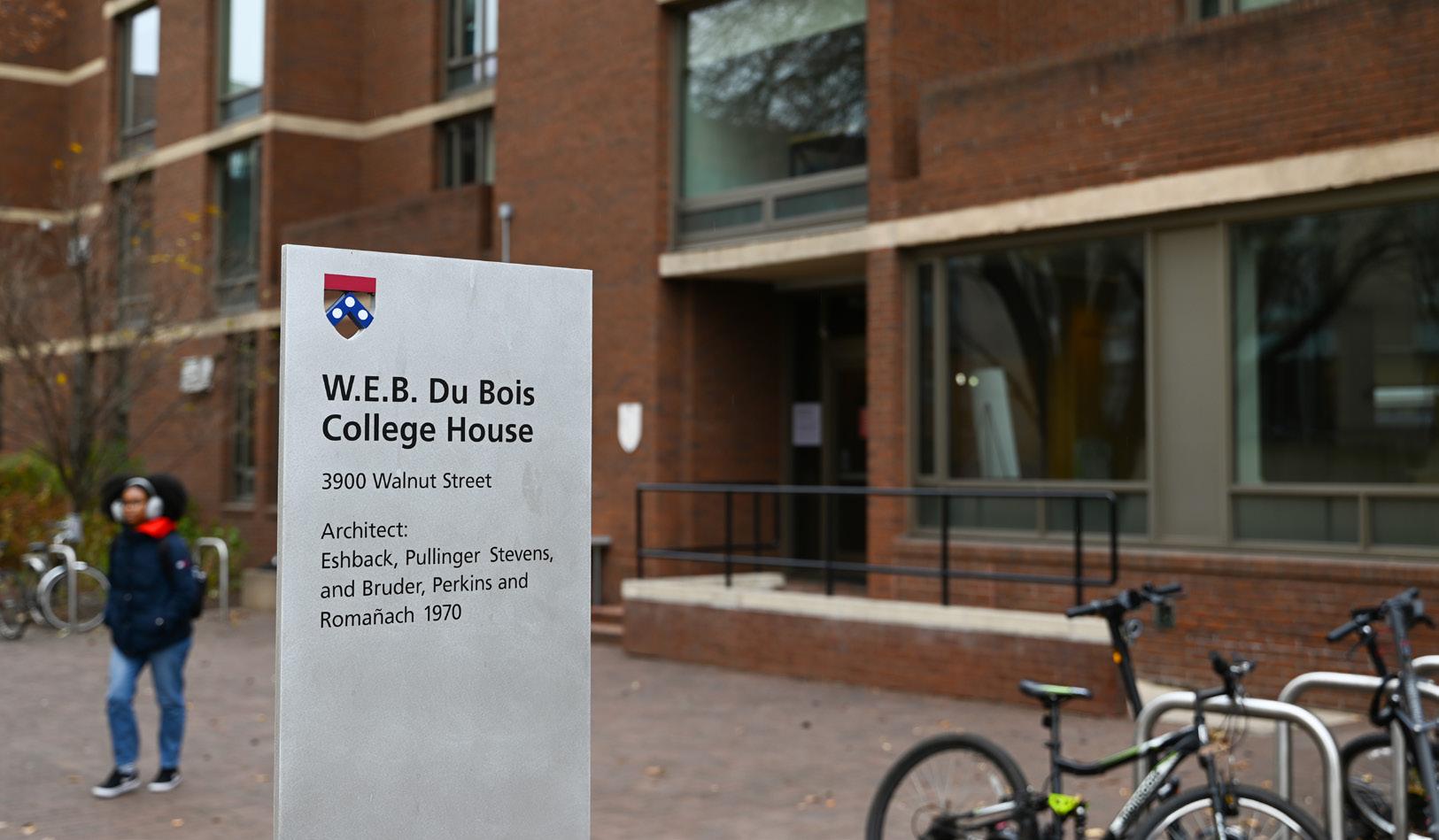
gathered to watch the Africa Cup of Nations finals.
“Our MPR after 5 p.m. is very vibrant,” Daché said.
Despite the strong community supporting Du Bois, residents said they are aware of the challenges facing the College House. Students in the College House have historically reported substandard living conditions compared to other college houses, with many saying the amenities prevented their return. The dorm lacked air conditioning until 2019 and is missing other accommodations, such as full kitchens, which have been built-in to newer college houses such as Gutmann and Lauder.
“There are a lot of amenities in other dorms that compel people away from Du Bois," 2023 College graduate Emilia Onuonga said when asked about the dorm in 2022. "... We know that Penn has the resources to invest in Du Bois, and yet they have not done so.”
With Quad and Stouffer college houses receiving renovations as part of the Penn Connects 3.0 plan, some residents have wondered which dorms are the next target. Du Bois is not among the buildings listed as part of Penn’s current stage of campus development. However, the building recently received upgrades to its facilities,
including a dance room and new furniture.
Gayle, who cited the poor amenities as the reason he did not rank Du Bois first as an incoming first year, expressed interest in an elevator.
Despite calls for improvements to Du Bois, some residents are concerned about what that could mean for those involved with the house.
“If Du Bois does get renovated, where do the Black students and staff go?” Dickens said. “When you feel like you have a sense of community and home here, it’s hard to go without.”
Even for those accepting of the current conditions, there are obstacles to staying in the house. Multiple students spoke about challenges encountered with the University's room selection process and how that impacts the dorm’s population.
“It’s tough. I wanted to live with certain people, but they didn’t get to return to housing — there’s just a lot of issues that arise that way,” Dickens said when asked about their room selection experience.
This trend has led to frustration for some Black students who believe the University does not do enough to prioritize Black students who want to live in the house over non-Black
students — some of whom did not rank Du Bois as a housing choice.
“My freshman year we had a lot of non-Black engineers or nurses on our floor saying things like ‘I wanted to live in Lauder and Quad,’ and don’t even remember ranking Du Bois,” Dickens said. “Then I go outside and there’s a lot of Black students saying they really want to live here and ranked it first.”
Senior Executive Director of Business Services Douglas Berger, who oversees on-campus housing, previously told the DP that the University has to abide by fair housing laws — meaning that neither residential communities nor housing applications consider race. The Du Bois website echoes this, stating that “from its inception, the Du Bois program never rejected students on the basis of race."
When asked how the makeup of the house influences Du Bois’ mission, Daché emphasized Du Bois’ commitment to supporting Black students while inviting students of African descent and those who are not.
“There isn’t an expectation that you have to be of African decent to live in Du Bois,” Daché said. “Yet the mission is based on the inclusion of Black culture around the diaspora."
18 QUAKER DAYS THURSDAY, APRIL 11, 2024 | THEDP.COM THE DAILY PENNSYLVANIAN
PHOTO BY DEREK WONG
Makuu’s Robeson Cooper Scholars Program nurtures community for Black Penn students
The program aims to support, uplift, and amplify Black students at Penn by providing an open space for fellowship and a nurturing environment.
HENESSIS UMACATA Staff Reporter
Members and alumni of the Robeson Cooper Scholars Program spoke with The Daily Pennsylvanian about how the program has impacted their time at Penn and beyond.
The Robeson scholars program aims "to identify and nurture students interested in interdisciplinary social justice excellence in and out of the classroom." The program runs out of Makuu, Penn's Black Cultural Center, and selects 15 students interested in social justice to form annual cohorts. Scholars are selected based off their civic engagement and community involvement within Penn and Philadelphia.
The Robeson scholars program was founded in 2007. It is led by Makuu Director Brian Peterson and Makuu Associate Director Michelle Houston, who did not respond to a request for comment.
2019 College graduate Adamseged Abebe described the program as "great exposure to the ideals and the concepts of what it means to be an African-American in the U.S."
Abebe, who is from Ethiopia, said that the Robeson Cooper Scholars Program created a space for him and other international students to engage in discourse surrounding race in the U.S.
“For internationals, there may be a sense of misunderstanding or perhaps lack of care about the issues in the U.S. because there are so many back home that you care about. It can be a missed opportunity to engage, especially as a Black person, in critical issues like race,” he said.
Abebe earned a Bachelor of Science and a Master of Science from Penn. He became the first Ethiopian to be awarded an inaugural Global Rhodes Scholarship for graduate study at the University of Oxford in 2018. After completing his doctorate in philosophy, he began his work at the World Bank in Washington.
College senior Jayla Rhodes was invited to join the collective of scholars during the pandemic, before her first year at Penn. For her, the Robeson scholars program was an early gateway into Penn’s Black community.
"[Robeson scholars] has been a stable environment to keep me grounded in my understanding of the community, not only from the directors but also from the mentorship of other Black students who went through it,” she told the DP.
Rhodes is currently pursuing a degree in architecture — with plans to

attend graduate school after her gap year — and hopes to become involved in urban planning and development. She shared her visions for improved connection between scholars.
She hopes the program "can give people the opportunity to become informed about the resources available and start using them earlier than I did." Rhodes also praised the program’s access to resources but said that participants “are not as interconnected.”
College junior Ebunoluwa Akadiri credited the Robeson Program for helping to curate more spaces for Black artists at Penn. In addition to being a scholar, Akadiri is also president of The Inspiration — an acapella group that celebrates the legacy of the Black diaspora — and is a co-founder of QBlack, a student organization that creates a safe space for Black, queer
students.
“I hope that as people continue to join the program they continue to use that space to grow more spaces for Black voices, because I truly believe there is not enough of that,” Akadiri told the DP.
Akadiri said she has acquired a number of skills through the program, improving her public speaking, experiencing intellectual growth, and gaining knowledge of contemporary issues. She also credited the program for her overall growth as a community member.
“The program truly enables you to put your best foot forward and step into spaces you otherwise would not have,” she said. “More than being an academic and scholarly program, it is also a program that takes the time to care about us not only as students but as people."
Akadiri plans to enter the healthcare consulting sector after graduating and hopes to pursue a Master of Public Health and a J.D. to help disenfranchised people of color.
Scholars LAO highlighted the informal connections and space of belonging as an essential characteristic of the program.
“For anybody else who envisions themselves either needing it or wanting it, they would certainly find a home in Robeson Cooper,” Rhodes said.
Abebe emphasized his hope that the program will become better funded in the future.
“There are several organizations that are better funded [than the Scholars program],” Abebe said.
“That tells you about the inequality in what is available in fellowships, so there is an opportunity to make the program stronger.”
19 QUAKER DAYS THURSDAY, APRIL 11, 2024 THEDP.COM | THE DAILY PENNSYLVANIAN
PHOTO BY TJADEN LITWILER
Inside the diverse paths international student-athletes take to Penn
While there are unique challenges for these student-athletes, coming to the U.S. for college offers unique benefits.
WEINING DING Sports Reporter
For most juniors in high school, the biggest of their worries is joining clubs and studying for their next math test. But for international student-athletes — especially those with aspirations of competing at an Ivy League school — the period between early junior year to the end of senior year becomes a race for recruitment.
Penn has the highest percentage of international students in the conference, at around 13%. Beyond that, 13 of 19 athletic programs have international students on either their men's or women's rosters, including basketball, rowing, soccer, squash, tennis, and track and field. With talented athletes from all over the world, international recruiting is a whole different beast that recruiting coordinators have to tackle. For student-athletes themselves, a plethora of barriers are experienced before they can begin forging their own path to Philadelphia.
To find student-athletes from other countries, coaches often utilize youth international championships over the summer to meet with and gauge the skills of prospective recruits. Stefano Solano — a freshman men's heavyweight rower from Como, Italy — recounted his international recruitment experience.
“Usually, coaches from

the U.S. go to the U19 World Championships, and that usually is in the beginning of August or at the end of July," he said. "After the races, they go to the strongest guy, the guy that got medals and stuff, and ask them if they are interested in studying abroad.”
International student-athletes, like all Ivy League recruits, must take and score well on the SAT or other standardized tests, whether it is easily accessible in their home country or not. Along with this requirement, they must also prove their English proficiency and capability to study well in an English-language classroom environment.
International athletes can also have the chance to try out living on campus with a prospective teammate for a few days during official
visits and decide if the team culture and academics are a good fit for them.
“Consider the school and your experiences on the official visit if you have one,” sophomore Kampton Kam, a high jumper from Singapore, said. “Can you see yourself fitting in this context, whether it be academics or athletics? You should get into the uncomfortable details and just decide for yourself what you want for life in college. You don't want to rush into anything.”
Penn’s pull is influential even across the globe. Many international recruits hear about Penn from parents, friends, and teachers as a strong place to both study and compete athletically.
“Penn is a famous name around universities,” Solano said. “So I knew [about]
Penn even before getting in touch with coaches from here.”
But in the end, what draws international athletes to the Red and Blue is the chance to study at an Ivy League while competing as the Quakers in a closeknit team. Omar Hafez, a sophomore men's squash player from Egypt, fondly remembers his reasons for choosing Penn.
“What motivated me is the team chemistry and the team culture here," he said.
"Actually, I like everything. I like the facilities, and one of the main reasons is that some of my friends are here and I've grown up with them in Egypt. So for me to be with them again in the U.S., at the same school, studying together, and playing in the same team, it's great.”

20 QUAKER DAYS THURSDAY, APRIL 11, 2024 | THEDP.COM THE DAILY PENNSYLVANIAN
DESIGN BY EMMI WU
Athlete Ally seeks to support LGBTQ+ student-athletes at Penn
Senior butterfly swimmer
Peter Lee founded Penn's chapter this school year
ANDREA MENDOZA Sports Reporter
In a step to making Penn's student-athlete community a more inclusive space, national organization Athlete Ally has opened a new chapter.
Athlete Ally, in the words of chapter founder and senior butterfly swimmer
Peter Lee, “champions and advocates for LGBTQ+ rights in athletic spaces, especially through college campuses.” Lee continued that the mission of the organization is to “end homophobia and transphobia in sport and to activate the athletic community to exercise their leadership to champion LGBTQI+ equality.”
The organization has active chapters in many universities across the nation, including several other Ivy League schools, such as Columbia, Harvard, and Princeton.
Lee said he was motivated to bring Athlete Ally to Penn for two main reasons: a lack of community for queer student-athletes and in response to transphobic sentiment he's observed in the media and the Penn community.
Due to the COVID-19 pandemic, Lee's first encounter with the student-athlete community on campus came in his sophomore year. He spoke about feeling like an outsider as a queer male athlete. Lee said
he expected to see more support but found nothing of the sort.
“I literally didn't see anyone like me,” he said.
“I think at the time, I knew three other queer studentathletes, and all three were on the swim team. I didn't know any other queer student-athletes at Penn. And there was no visibility, especially for guys.”
Also during the 2021-22 school year, former Penn swimmer Lia Thomas competed and became the first openly transgender athlete to win an NCAA Division I national championship. Thomas's success was accompanied by demonstrations and national and international media coverage.
In February 2022, 16 members of Penn's women’s swimming and diving team sent an anonymous letter to the University and Ivy League officials via Nancy HogsheadMakar — a 1984 Olympic swimming gold medalist and lawyer and chief executive of Champion Women, a legal organization that advocates for women and girls throughout athletics. In the letter, the swimmers claimed that Thomas was taking "competitive opportunities" from the rest of the team. Furthermore, they asked the University and Ivy League to refrain from taking legal action against the NCAA if it was to adopt a policy that would effectively ban Thomas from competing.
As a result, Athlete Ally — in collaboration with Schuyler Bailar, a Harvard swim alumnus and the first publicly documented trans-

gender person to compete in all men’s NCAA Division I sports — organized a letter in support of Thomas with signatures from over 300 current and past NCAA, Team USA, and international swimmers.
Lee said that the negative treatment of Thomas by the media, along with the transphobic sentiment he came across, only further motivated him to start an Athlete Ally chapter at Penn.
The process of bringing the organization to Penn has been one of big administrative hurdles and tests of commitment, but the cause is worthwhile for Lee.
Now that it’s an established club, he said that creating a sustainability plan is key to cementing it as a longlasting place on campus.
There have been queer student-athlete groups before, but none that have retained strong membership for more than a couple of years, according to Lee.
The Penn Athlete Ally board is currently composed of mostly seniors. As such, Lee said that the club hopes to attract younger queer student-athlete leaders in the next year and build a lasting foundation for Penn's community.
Other than Lee, the current board features athletes representing various teams, including junior women's rower Kate Butcher, senior
women's track and field runners Phoebe White and Bella Whittaker, and senior women's rower Amelia Demopoulos.
Creating the space is the first step, but attracting queer athletes is another challenge within itself, according to Lee. He said that in a heteronormative world, it’s important to acknowledge that starting a queer club comes with other considerations for the safety and comfort of the students it aims to support.
“I don't think a lot of people realize how hard it is to gather queer athletes. I think the first step is being willing to be outright. I was out to the community and became a spearhead,” he said. “But I think for a lot of people, being out and attaching their name to this cause is definitely a big step forward.”
Another facet the club promotes is heightened visibility and representation for this intersectional group and the people it aims to represent. With about 1,000 student-athletes on campus, Lee said creating a safe environment for intersectional groups is imperative in supporting their unique experience.
Whittaker was also involved in the founding of Black Student-Athletes at Penn, a club dedicated to creating a community for students who share the
unique experiences that Black student-athletes encounter. Like Athlete Ally, there was not a club specifically dedicated to this community of athletes before her arrival in 2020.
"You’d think that in 2020, there would exist clubs like this, but it's just crazy that I've been involved with [building two clubs] from absolutely nothing and that these just didn't exist before,” Whittaker said. “I just feel like both of them [were] really much needed."
As a Black and queer student-athlete serving on the boards of both BSAP and Athlete Ally, Whittaker is able to provide insight about her experiences and represents another area of intersectionality.
"As someone who's on the board of BSAP, I think it's really important that I exist in both spaces, and I'm able to bring that different perspective into Athlete Ally and vice versa for BSAP," Whittaker said.
"I think representation and just having a community that's public is really important, especially if you're in the minority group," Lee added.
Over the next couple of months, club leaders said that Athlete Ally at Penn will continue its expansion efforts and grow its community, hoping to support queer student-athletes both in and out of season.
21 QUAKER DAYS THURSDAY, APRIL 11, 2024 THEDP.COM | THE DAILY PENNSYLVANIAN
DESIGN BY EMMI WU
Editorial | From us to you; our Penn review for the Class of 2028
THE DAILY PENNSYLVANIAN EDITORIAL BOARD
Dear Class of 2028, Congratulations, and welcome to Penn! Today, March 28, is Ivy Day, possibly one of the most important days of your life (so far). With the release of admissions decisions from all eight Ivy League institutions, you are one step closer to embarking on your college journey and sculpting the path to a future of success.
As prospective students, it is important to evaluate key elements that define the Penn undergraduate experience. Using a scale from one to five, one denoting “poor” and five representing “excellent,” we’ve rated each category to offer a nuanced perspective of our Penn experience to help guide you in making your decision.
Academics: 5/5
Penn is renowned for its rigorous curriculum and distinguished faculty that collectively foster an environment of academic excellence. Penn encourages interdisciplinary studies, offering various opportunities for students to pursue coordinated or accelerated dual degrees, specialized programs, University minors, individualized majors, and even scholar programs where you can take intellectually stimulating classes. These opportunities are a great way of exploring courses across the University's four undergraduate schools. While this interdisciplinary approach is at times quite challenging to pursue, it does allow you to tailor your academic jour-
ney to your interests and career goals.
From Nobel Prize winners to globally known researchers, Penn professors are well known for their contributions to significant advancements in technology and society. This high level of expertise ensures that you receive an education that is closely linked to real-world applications.
If you’ve never done research prior to college, Penn is the perfect place to start. Through initiatives like the Center for Undergraduate Research and Fellowships, students have the opportunity to pursue independent projects and work closely with faculty who have spent their entire careers dedicated to research.
Although Penn provides a wide range of opportunities for involvement, they may not always be readily available. In order to succeed in a competitive environment, you must be proactive to seize these opportunities. This serves as a reminder that the opportunities for a fulfilling academic and research journey at Penn are abundant, but they rely heavily on student’s actively seeking these opportunities.
Campus Environment4/5
From international students to lifelong Philadelphia residents, Penn is extremely diverse. While it can take anywhere from a semester to a year or more to establish yourself on campus and find friends, patience is key. There are roughly 1,200 student clubs
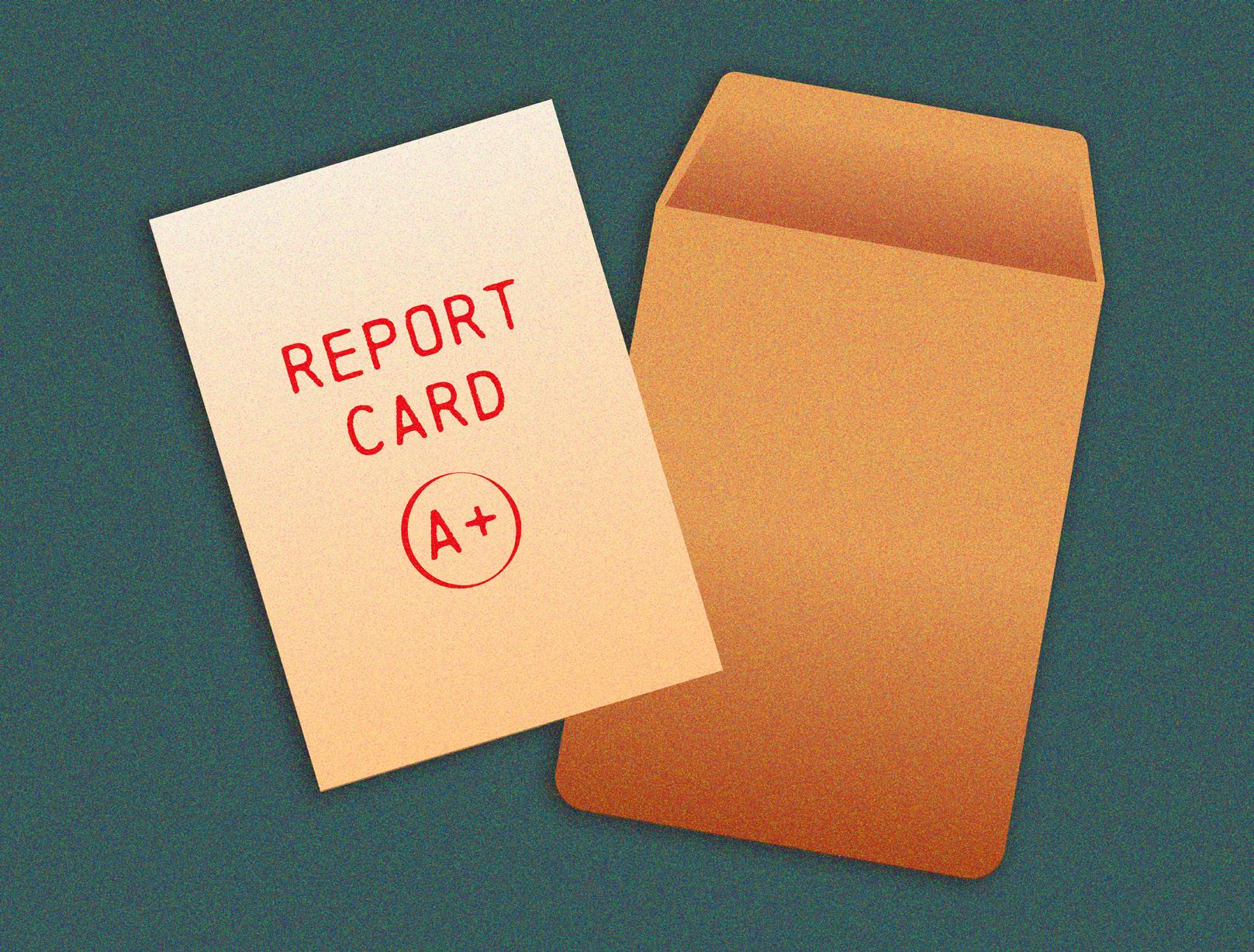
on campus, which range in focus from finance to film creation. While some clubs require applications and tend to be competitive, many welcome all members and are excellent places to meet your future community. The array of options may be overwhelming, but resources are available to help guide you through the student experience, which includes joining, and if need be, dropping various extracurriculars to find your niche.
With nearly 20% of the student body involved, Greek life is ripe with friendship opportunities. Penn also provides ample resources in its cultural centers: the LGBTQ Center, the Penn Women’s Center, and Greenfield Intercultural Center, among others.
Competitiveness - 2/5
With an admission rate of 5.8%, Penn selects a pool of extremely competitive and qualified students who are high achievers and committed to maintaining the same level of achievement in their new setting.
Penn is widely recognized for its preprofessional culture, which fosters competitiveness within the
campus environment. However, this competitiveness has the potential to dampen the passion one might have for a certain field. Many students enter Penn with no previous interest in the world of business, yet with Penn’s culture of elitism and pressures from your peer’s successes, more than 50% of graduates make the trek to Wall Street. Whether you’re slogging through club applications that feel like college admissions all over again, or struggling to get a spot in a class with only 70 seats, the intense pressure at Penn is impossible to ignore. The so-called “Penn Face” phenomena is one way this pressure shows itself; it’s best described as the facade your peers may put on to appear calm and peaceful while they’re going through a lot.
Penn’s environment offers an opportunity to expand your limits and surpass your own expectations. Through navigating these highs and lows, the true essence of Penn is revealed — a multifaceted blend of ambition, knowledge, and connections that serves as preparation for the real
world.
Housing and Dining- 3/5
The complaints about the quality of dining halls and housing options at Penn keep on mounting. However, dining hall criticism is a common theme at many colleges, not just at Penn. It is crucial to understand that serving hundreds of meals every day is a difficult task that includes balancing variety, quality, and logistics. While some of the dining halls and meal plans might not be the most efficient options that Penn can offer, Penn Dining does a decent job in making a range of choices available to students.
On the other hand, the problem with housing lies in the inequality of the lottery system used by students. Each student’s dormitory — with the exception of upperclassmen who may choose to live off-campus — are chosen through a lottery system. The quality of the dormitory you live in is entirely dependent on obtaining an early room selection time slot that is completely out of your hands. This system places some students in newly-renovated large apartments, while others
22 QUAKER DAYS THURSDAY, APRIL 11, 2024 | THEDP.COM THE DAILY PENNSYLVANIAN
DESIGN BY JANINE NAVALTA
are forced to share a 11x16 room with a roommate. With a yearly wait-list of 800 students, the housing lottery system is unable to accommodate all students on campus and is in much need of a renovation.
Should upperclassmen elect to stay on campus, whether they are placed on a waitlist or not is often a matter of chance, jeopardizing their likelihood of finding housing for the following year.
At the end of the day, we all know that dining and housing at Penn goes beyond the food you eat and the place you live in. No matter how much improvement is needed, the memories you will make with your friends over dinner at 1920 Commons or while studying in the rooftop lounges for finals are priceless parts of the Penn experience that you will remember for years to come.
City Life - 5/5
As one of the most historically significant cities in the country, Philadelphia is one of the best places to attend college. Just a couple blocks from campus in West Philadelphia, you can explore the Clark Park Farmers’ Market on Saturdays, as well as many restaurants of varying cuisines, from Ethiopian to Thai. Venturing east of the Schuylkill River, you have a myriad of opportunities to explore meals and produce at the Reading Terminal Market, shopping in the Fashion District, or the history of the nation near Independence Hall.
To address concerns about student safety in such a large city, the University has taken steps to protect students, including Penn Transit, which runs through campus and beyond after dark, and the placement of police officers on every block after sundown.
SEPTA, the regional public transportation system, is very affordable, and Philadelphia is extremely
walkable. The many different neighborhoods of Philadelphia — such as Old City, Northern Liberties, Fishtown, and Rittenhouse Square — all host unique attractions. If you venture 45 minutes outside of the city, Pennsylvania is home to Valley Forge and the Wissahickon, where there are hours of hiking paths and historic walking tours. Besides being known for incredible cheesesteaks, Philadelphia boasts some of the best museums in the country: the Rodin Museum, Mütter Museum, and the Barnes Foundation. Between the Birds, Phillies, and 76ers, Philadelphia is the proud home to some of the best sports teams in the country year-round, and our infamously boisterous fans love to shout it from the rooftops.
From the New Student Orientation carnival to an evening at the Philadelphia Museum of Art, we all remember that mixture of excitement and nervousness when we began our college experience. College challenges us to grow as individuals while simultaneously expanding our worldview. At Penn, you can build a home away from home — a community that, through thick and thin, becomes an integral part of who you are. Despite its ups and downs, Penn will become your home for the next four years in the same way it is now home for us.
Welcome to your incredible journey ahead, Class of 2028. Editorials represent the majority view of members of The Daily Pennsylvanian, Inc. Editorial Board, which meets regularly to discuss issues relevant to Penn’s campus. Participants in these meetings are not involved in the reporting of articles on related topics. Reach us at edboardchair@dailypennsylvanian.com
Opinion | The postcollege application metamorphosis
SANGITHA AIYER Opinion Columnist
To the incoming Class of 2028, congratulations! You have entered the tricky lottery that is the college admissions process and come out on the other side victorious. You likely poured your heart into every minute detail of your application in the hopes that the admissions office would select you, above every other qualified candidate. I was in your exact position just two short years ago.
My application, like that of many admitted students, was a carefully curated collection of my passions, aspirations, and achievements. It showcased the very best version of myself, in every letter grade on my transcript and sentence of my Common Application essay.
To the admissions committee, I was an aspiring linguistics major with musical talent and a dedication to community service. My international upbringing provided me with unique, worldly perspectives, and I expressed a special interest in exploring the city of Philadelphia through classes and extracurriculars. My teachers and counselor described me as a hardworking team-player who was a joy to have in class.
Two years later, I can confidently say that the person in my application — the one with the electric personality, near-perfect grades and wildly lofty ambitions — is not who I am today. In fact, she’s also not the person that I truly was a year and a half ago when I clicked submit on my application. Behind those bold words
instance, was never something that had crossed my mind before entering college. I had zero experience with journalism and had never even regarded myself as a good enough writer. Now, here I am.
and ideas lies somebody who is a lot less sure of herself. She has regular moments of clarity but also the crippling fear that she is experiencing a midlife crisis at the age of 19.
I suspect that I am not alone in feeling that way. The competitiveness of college admissions requires us to craft a persona. Given Penn’s sub-6% acceptance rate, applicants have no choice but to present themselves in a perfectly palatable way. We make promises to the admissions committee, in regards to the person we are and the person we hope to become on their campus.
However, these promises were made to be broken. I recently reread my application to Penn and seeing the disconnect between the messages I’d penned and the life I currently live was jarring. The future I visualized with paragraphs of flowery descriptions portrayed a version of my current self that has not come true in the way I intended. This has been a difficult thing for me to come to terms with. What exactly does it mean when we drop our intended majors, or when we replace a future career in the arts for something a little more lucrative, like finance or consulting? Call it the Ivy League sellout culture, or maybe just call it self-discovery.
Indeed, opportunities for self-exploration run rampant at Penn. With over 450 student organizations and countless ways to find community, it is not uncommon for us to morph into new, oftentimes better versions of ourselves during our four years here. Writing for The Daily Pennsylvanian, for
But there may just be a larger issue at hand. Elite college admissions forces applicants to shapeshift. We vie frantically for the chance to secure a seat in the ivory tower, even if that means exaggerating our passions and very identities. Even worse, the application process forces us to reaffirm these identities over and over again, be it through the ideas expressed in our supplemental essays or the intended major drop-down. It is not surprising then that many students, myself included, find it difficult to disentangle themselves from their application personas.
Since coming to Penn, I have felt immensely guilty forgoing my linguistics aspirations, abandoning a prior musical talent, and finding new activities in which to invest my time. However, I think there’s something beautiful about how a new environment, opportunities, and people can change us. While clicking submit on my application two years ago, it was this hope that caused me to leave home to attend college oceans away.
I assure you that departing from your application self is not only normal and expected, but it is something to aspire to. When you think back to the person you were before coming to Penn, you may not recognize them. You may reread your application like I did and realize that your future has turned out differently than how you anticipated. And that’s okay. As you begin this four-year journey, be it at Penn or any other institution that you choose to attend, allow yourself the grace of growth.
23 QUAKER DAYS THURSDAY, APRIL 11, 2024 THEDP.COM | THE DAILY PENNSYLVANIAN













24 QUAKER DAYS THURSDAY, APRIL 11, 2024 | THEDP.COM THE DAILY PENNSYLVANIAN STUDYING LATE? WE’RE OPEN LATE! Domino’sTM 215-662-1400 4438 Chestnut St. 215-557-0940 401 N. 21st St. WE MAKE ORDERING EASY! CALL DIRECT OR CHOOSE YOUR ONLINE OR MOBILE DEVICE RECEIVE a FREE! 8 Pcs of Bread Twist (3 options) Use Coupon Code [8149] | Minimum $15 Purchase - Delivery Only WHEN YOU ORDER ONLINE SUN-THURS: 10AM - 2AM • FRI & SAT 10AM - 3AM





















































